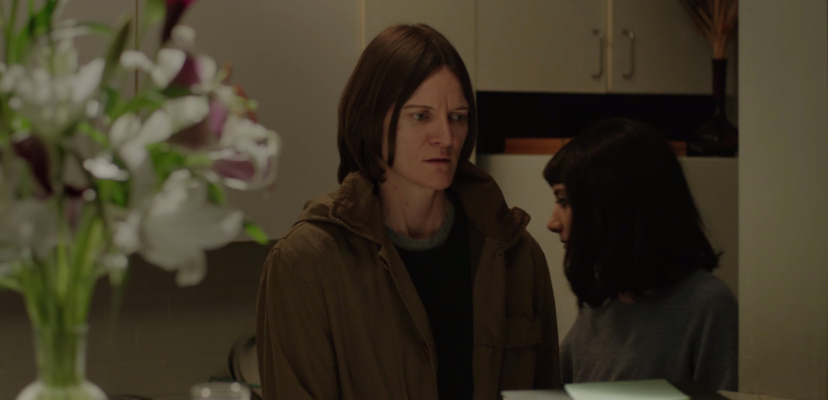10 Sad (But Non-Lethal) Movies for the Casually Depressed Queer Woman
There is no shortage of lesbian+ movies filled with tragedy. Check out the canon of queer women cinema and you might just think suicide and terminal illness outrank astrology when it comes to lesbian culture.
These tropes have been met with a backlash of queer audiences shouting for stories with happy endings. At least once a week I send a list of “happy lesbian movies” to someone on Twitter. It might not seem like it, but there actually are quite a few happy masterpieces of lesbian cinema: Bound, Saving Face, But I’m a Cheerleader, Desert Hearts, Carol if you interpret that final look the way I interpret that final look, the list goes on and on.
But what about depressing lesbian+ movies that aren’t tragic? What about movies where no queer women die but maybe a queer woman spends the whole movie low-key wanting to die? And not because of homophobia! Look, homophobia and transphobia obviously impact my life, but most of the time my depression has little to do with either.
The women on this list are sad because they’re self-destructive or have had their hearts broken or just have good ol’ fashion mental illness.
Maybe you’ve been separated from your lover because your homophobic society won’t accept your love. If so DM me and I’ll send you 350 movies to watch. But personally I’m sad because sometimes life is just really hard.
10. Certain Women (2016, Kelly Reichardt)
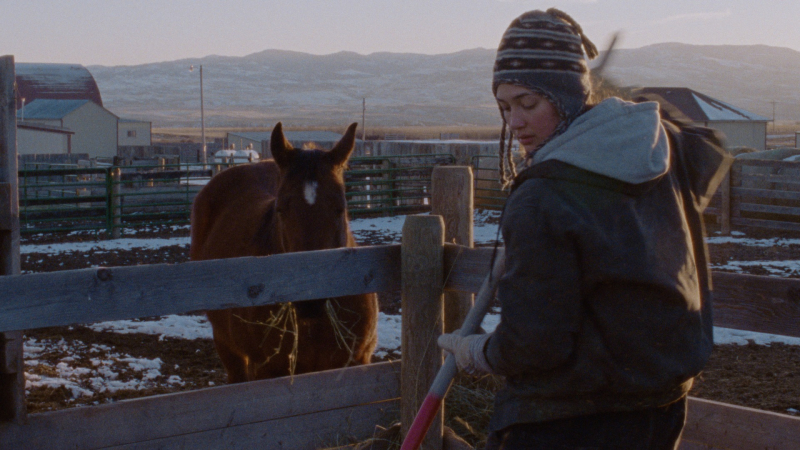
Yes, this movie is called Certain Women, but it could also be called Sad Women. This triptych of stories has renowned lesbian auteur Kelly Reichardt’s famous touch of melancholy. The gay story of the three finds Lily Gladstone’s rancher falling hard for Kristen Stewart’s part-time law professor. They sort of connect, but it’s pretty one-sided. What might have been a grand romantic gesture in a romcom is instead an awkward failure. Oh well. Guess it’s better to try and fail than to never try for anything.
9. The Bitter Tears of Petra von Kant (1972, Rainer Werner Fassbinder)
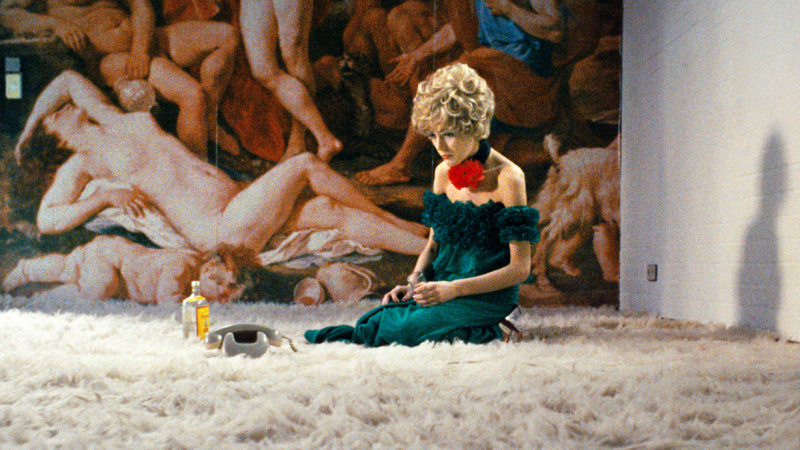
The women are almost as beautiful as the costumes in this arthouse classic, but this painful film is far from pretty. Fashion designer Petra von Kant has an assistant named Marlene who she treats terribly and a new love named Karin who she fauns over miserably. Petra is cruel. Karin is cruel. Even in her own way, Marlene is cruel. They’re awful to each other and it results in a lot of despair. It also takes place entirely in one room just like me when I’m depressed.
8. Can You Ever Forgive Me? (2018, Marielle Heller)
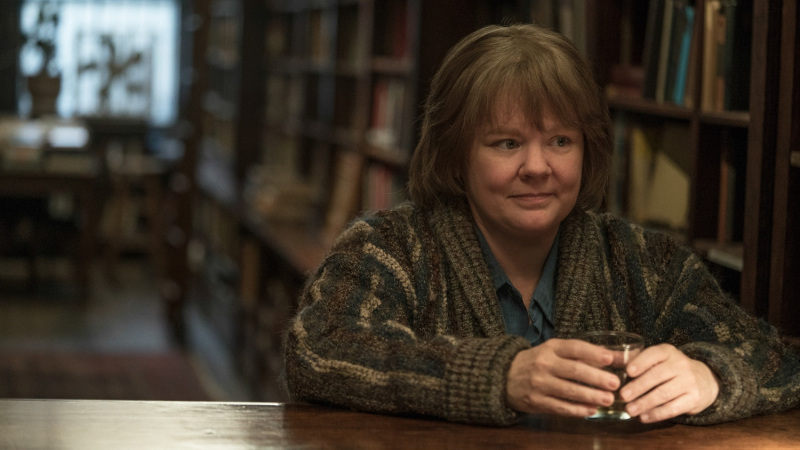
Lee Israel is lonely and unsuccessful because she’s mean and unpleasant. Melissa McCarthy makes no attempts at likability in her portrayal of Israel, but she does reveal her humanity. As we watch her make a friend, fall into fraud, and even go on a date, we begin to feel like maybe Israel’s flaws aren’t so different from our own. And maybe there’s still something worthwhile about her. She never really changes. She never really learns to compromise. She never really cuts down on her drinking. But she’s smart. And she’s funny. And she loved her cat. Oh right, sorry, a warning. There is one death in this one.
7. The Summer of Sangailė (2015, Alante Kavaite)
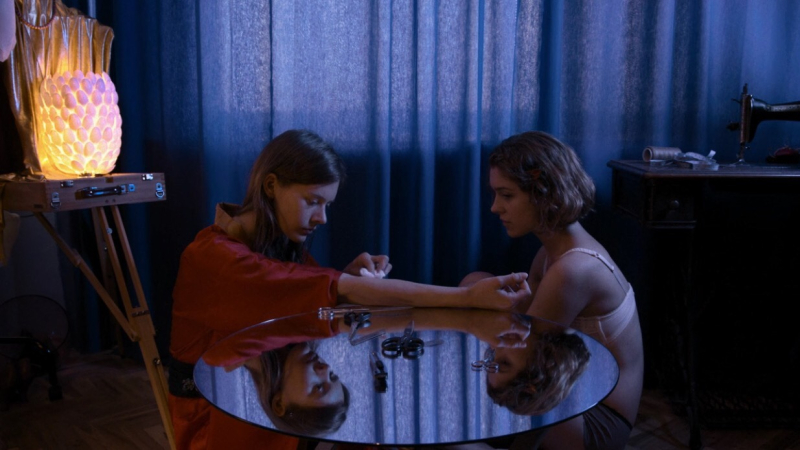
When we meet Sangailė she’s obsessed with becoming a pilot but terrified of flying. She has no friends and she engages in frequent self-harm. But then she meets Austė. The two develop a romance and there are moments of real passion. But this isn’t a love story. Austė helps Sangailė overcome her fears and stop hurting herself. And then the summer ends. There’s a limit to how much we can grow. There’s a limit to how much we can help those we fall for. It’s not that their meeting isn’t special. It’s not that their lives aren’t changed forever. It’s just that there are limits. Some things aren’t meant to last more than the time they last.
6. Set Me Free (1999, Léa Pool)
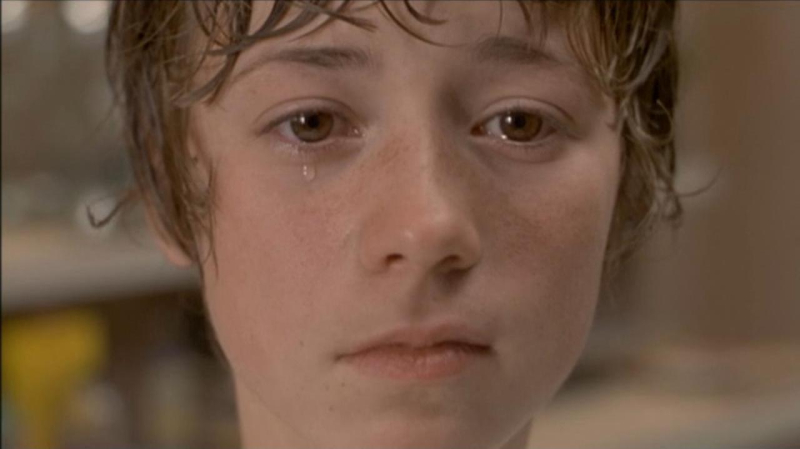
Before she made everyone’s favorite falcon suicide boarding school movie, Léa Pool made this far quieter – but equally sad – coming of age tale. Hannah is a 13-year-old with a terrible home life and a painful crush on her teacher. Then she meets a cute girl only for the girl to start dating her brother. (Do you remember how shitty it was to be 13??) But Hannah does what I did at that age and clearly still do now – she turns to cinema. She becomes obsessed with Anna Karina in Jean-Luc Godard’s Vivre sa vie, captivated by her beauty and her sadness. It’s an escape – a safe place to wallow. And this film is itself a safe place to wallow, and, of course, a great reminder that no matter what’s going on in your life at least you aren’t 13. (Unless you are 13 in which case I’m so glad you’re reading Autostraddle in middle school! You’re already doing better than I was!)
5. Eva + Candela (2018, Ruth Caudeli)

Queer women can have little a Blue Valentine as a treat. Like that heterosexual heartbreaker, Ruth Caudeli’s remarkable debut jumps in time between Eva and Candela falling in love and Eva and Candela falling apart. Alejandra Lara and Silvia Varón have so much chemistry in the scenes from the past it makes you want to climb into the screen and yell at them to get over their bullshit and work things out. But that’s not how movies work and it’s not how life works. Sometimes people are meant to be in love for a period of time and then they’re no longer meant to be in love. The end doesn’t take away from the beginning. The end doesn’t take away from all the years of partnership. The end is just a moment in time like all the other moments.
4. I’ve Heard the Mermaids Singing (1987, Patricia Rozema)
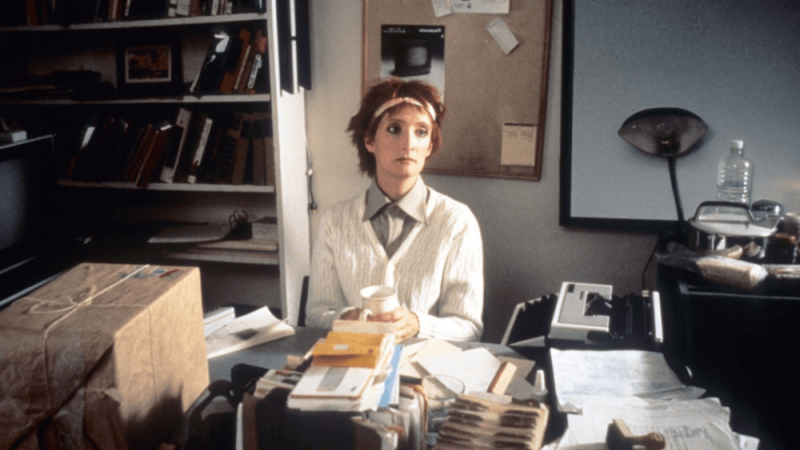
Everyone around Polly thinks she’s goofy and simple – including her art curator boss who she’s secretly in love with. But underneath her light-hearted veneer she’s a person with big wants and quiet dreams. She lacks the confidence to assert herself but that doesn’t mean she’s content. We watch as she stumbles through attempts at more, her interior captured by Patricia Rozema’s divine cinematic creativity. There’s something inspiring about these attempts. Polly may be sad but she has so much life within her.
3. Appropriate Behavior (2014, Desiree Akhavan)
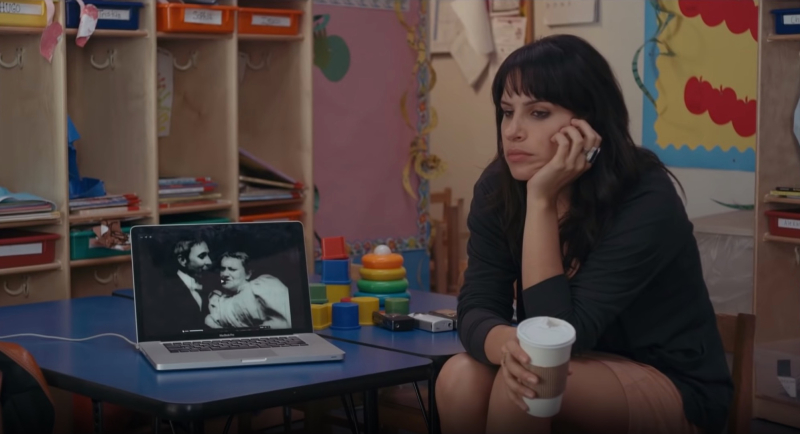
Shirin thought she met the only person in the world as sad and cynical as herself. She thought they were meant to be. Now in the wake of her break up she’s spiraling in a flurry of bisexual chaos. Writer/director/star Desiree Akhavan is a once-in-a-generation talent and her humor makes this an easy movie to watch. It may be painful in its relatability, but if you’re reading this list you’re already in pain so at least this movie will make you laugh. And while it does deal somewhat with homophobia – Shirin is struggling to come out to her family – it’s treated as one challenging aspect of her life instead of an all-consuming force. The truth is being queer does make things more difficult and does mean some of us are learning how to be people later than usual. Self-hatred and delayed adulthood get mixed in with the usual bullshit of life and sometimes it’s all just too much and all you can do is make some poor sexual decisions.
2. Je Tu Il Elle (1974, Chantal Akerman)
See below.
1. Les rendez-vous d’Anna (1978, Chantal Akerman)

Chantal Akerman invented a cinematic language of depression. The specific way she used long takes settles us into the sadness of her protagonists. There’s a lack of drama to it all – a dullness. I guess some people think she’s boring, but those people are wrong. She is still the only filmmaker to ever capture the exact feeling of my gay depression. These two films are especially gay and depressing and if you need to wallow you should put your phone away, turn on one of these movies, and sink into her world. When the movie ends you may just feel a lightness to your spirit. You may just feel like things aren’t so bad after all. You may just feel comforted in your recognition and inspired by her artistry. I mean, how bad can life really be when you get to watch Chantal Akerman movies?
The 50 Best Lesbian, Queer, and Bisexual Movies of the Decade
I just want you all to feel seen.
It’s corny, it’s cliché, but it’s true. I want every lesbian, every queer woman, every non-binary person, I want us all to know that our stories matter, and that they’re being told, and that they’ve always been told, and that we deserve even more.
Whenever I’ve said to someone I was working on a Top 50 Lesbian+ Films of the Decade list I’ve been met with the same question: Were there really that many?
The answer: Yes, of course.
But there’s a follow-up question worth asking: If there were that many lesbian movies, why does it feel like there weren’t?
The fact is most of the films about us — and especially the films by us — do not get the attention they deserve. They don’t get the budgets they deserve, the awards they deserve, the acclaim they deserve. But that’s why we exist — that’s why Autostraddle exists — because while we may not be able to fund the trans lesbian action movie of your dreams, we can remind you of the rare queer films that joined the zeitgeist and we can bring your attention to all the others you may have missed.
The “short” list voted on by the entire Autostraddle team was 171 films. Voting took place in two parts: Everyone gave each film they’d personally seen a rating out of ten stars and then chose their top five favorites. The overall ratings were used to put together one list and the favorites were used to form another. Then those two lists were combined for what you see here. Films that had many people rate them were also weighted slightly higher on that list.
The intention of this algorithm was to prioritize films featuring underrepresented groups while still not discrediting popularity. I wanted this list to bring attention to our favorite underdiscussed movies, but also for it to act as a definitive reflection of the decade in lesbian+ cinema.
It’s worth noting how many of the films allowed us to actually tell our own stories. Here are a few stats for you:
+ 31/50 films feature out queer women or non-binary actors in major roles
+ 26/50 films were directed or co-directed by queer women or non-binary directors
+ 11/50 films were directed or co-directed by queer women or non-binary directors of color
There are four queer directors who each have two films on this list: Desiree Akhavan, Ruth Caudeli, Madeleine Olnek, and Dee Rees. There have always been queer women auteurs (*cough* Dorothy Arzner *cough*) but it’s exciting that there are now multiple filmmakers getting the access to build extensive filmographies of explicitly queer cinema.
These numbers highlight that nobody is better equipped to tell our stories than we are. Hopefully, the next decade brings less of a divide in regards to budget, genre, and awards — in this decade the higher the budget, the more likely the movie was directed by a cishet man. I also hope the next decade has more movies with queer characters who are POC, trans, and disabled.
Well, without further ado – here is the Autostraddle Best Lesbian+ Films of the Decade.
50. Women Who Kill (dir. Ingrid Jungermann, 2016)
As a fan of The Slope, I wasn’t sure what to expect when I found out Ingrid Jungermann’s debut feature was going to be a thriller. How would her comic slice-of-life sensibility fit within a heightened genre? Turns out – very, very well. Still as funny and sharply observant as her other work, Women Who Kill, captures the horror of trust issues. Sheila Vand is excellent at one moment being mysterious, alluring, and possibly murderous and the next moment just being a troubled woman trying to fall in love. Her contrast with Jungermann is really fun to watch, and, ultimately, rather heartbreaking. It works as a comedy, it works as a thriller, and it works as an emotional drama about a doomed queer romance. – Drew Gregory
49. The Summer of Sangaile (dir. Alante Kavaite, 2015)
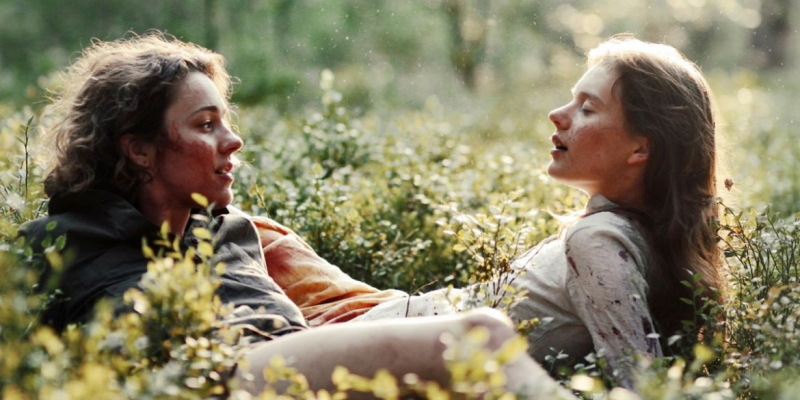
Alante Kavaite’s coming-of-age story about a queer teen obsessed with airplanes – and scared of heights – is deeply angsty and breathtakingly gorgeous. The lighting, the aerial photography, the costumes, the score, all make for a sensory experience that places you in the troubled mind of Sangaile. It’s a lovely tribute to the power of feeling truly seen, and an honest reflection on the limitations of love. Sangaile’s self-harm is handled with a fascinating balance of weight and levity. The film doesn’t minimize her mental illness or the severity of her actions, but it also never judges her. She’s a complicated person, right in the middle of the worst period of her life, and she’s trying. Julija Steponaityte and Aiste Dirziute are great as Sangaile and her new love, Auste. They have a chemistry that never quite clicks as we the audience understand their attraction and the limits of their teen summer romance. Sometimes love isn’t meant to last, but the few months we spend with a person changes who we are – who we can be – forever. – Drew Gregory
48. Wild Nights with Emily (dir. Madeleine Olnek, 2018)
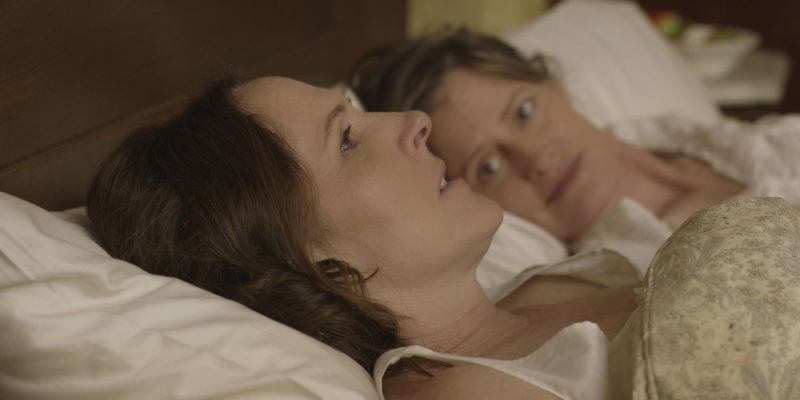
Emily Dickinson’s queerness is really having a renaissance right now! But before Apple TV’s brilliant (and awesomely weird) TV series starring Hailee Steinfeld as the beloved poet wooing her brother’s girl with her poetry and wit, Molly Shannon starred in an even queerer and weirder adaptation of Dickinson’s life. Writer/director Madeleine Olnek’s brand of quirk is singular and she brings all of it to bear on Wild Nights With Emily, challenging not only the deliberate erasure of Dickinson’s gayness from the historical record, but also the idea that Dickinson was a dour, virginal spinster. In Olnek’s view, and in Shannon’s hands, Dickinson is no angsty recluse; she’s silly and compassionate and brilliant and warm and wise and full of life and wonder. Wild Nights is both ridiculous and completely resonant. Truth told just the way Dickinson liked it — at a slant. – Heather Hogan
47. Grandma (dir. Paul Weitz, 2015)
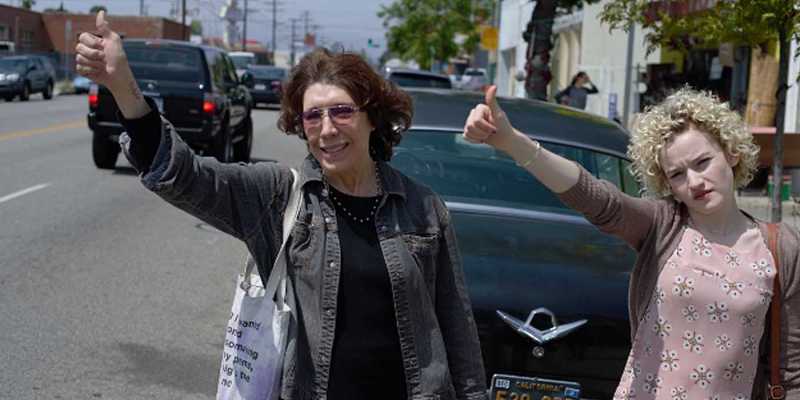
I can’t really explain why I love Grandma as much as I do. Actually, that’s not true — I absolutely can, and I can do it in two words: Lily. Tomlin. If you’re a fan of the lesbian comedian, then you absolutely cannot miss what’s perhaps her finest role. In Grandma Lily Tomlin plays, well, a lesbian grandma (obvious, I know!) who abruptly puts everything on hold to help her granddaughter with a life-altering favor. It’s chopped full with Tomlin’s signature quirky warmth, but also there’s a seriousness underpinning her performance that you don’t always get to see in her other work. Did I mention it also has a guest starring role for Laverne Cox? If you ask me Cox’s comic timing is criminally under appreciated, and in Grandma it’s in fine form. – Carmen Phillips
46. Annihilation (dir. Alex Garland, 2018)
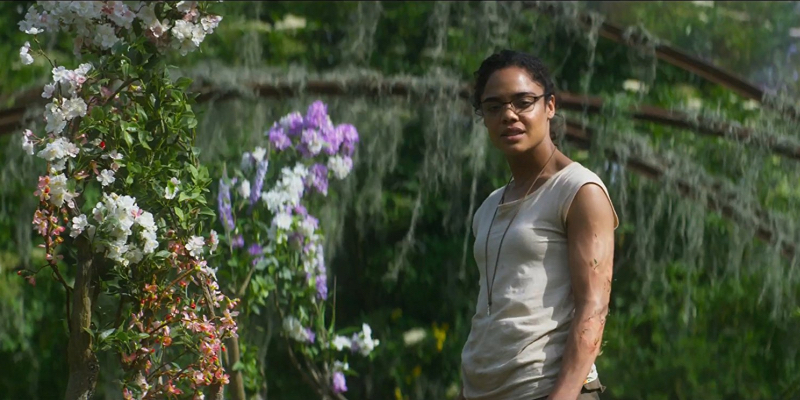
Annihilation mutates several times over the course of its sci-fi-horror story, jumping around in times and tones but ultimately spinning an unsettling and gorgeously constructed narrative on identity and self-destruction. At its climax, the film delivers one of the most haunting, dialogue-free film sequences of the decade, one that lends itself to myriad interpretations. Its score is phenomenal, as are its performances, which ground the movie despite all the sci-fi weirdness unfolding throughout it. Tessa Thompson and Gina Rodriguez bring specificity and stakes to what could easily be set-dressing characters, and the latter harnesses a major tonal shift halfway through the movie with a classic manic horror performance. – Kayla Kumari Upadhyaya
45. Kiss Me (dir. Alexandra-Therese Keining, 2011)
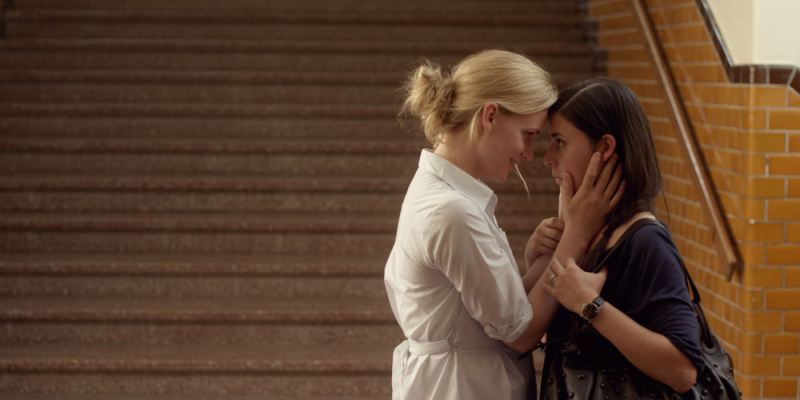
Kiss Me is the kind of lesbian movie we as a community tend to mock. A woman engaged to a man suddenly falls for a lesbian she’s tangentially related to? It’s become its own niche cliché. But the writing and performances in Kiss Me elevate it beyond its premise, or, rather, show why this premise is so attractive to filmmakers in the first place. There’s a truth to Mia’s confusion and Frida’s impatience. The situations that are usually used as plot hurdles instead deepen the characters. Who is this queer person so deep in the closet? Who is this other queer person falling for her? Should they even be together? This is a fun and sexy romance that doesn’t require you to turn off your brain – but might turn it on. – Drew Gregory
44. Can You Ever Forgive Me? (dir. Marielle Heller, 2018)
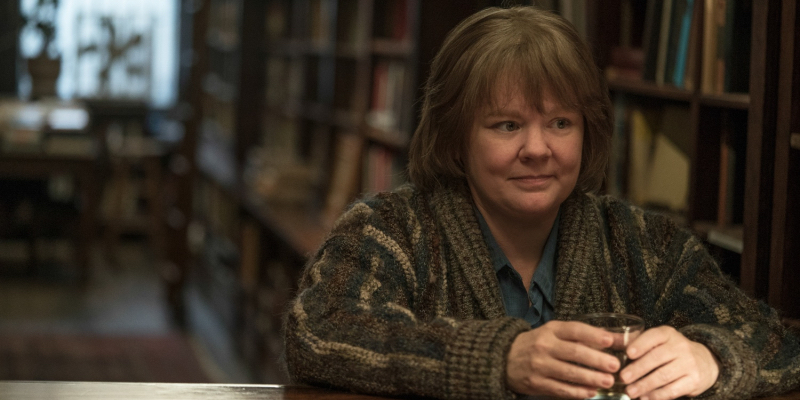
More movies should be as subdued as Can You Ever Forgive Me?, a charming comedy about an incredibly un-charming, real-life protagonist played by Melissa McCarthy in one of the best, most severe roles of her career. The movie lets biographer Lee Israel be acerbic in the way only tortured male artists usually get to be, but it also acknowledges the consequences of her intimacy issues, especially when it comes to her ex-girlfriend (Anna Deavere Smith), new love interest (Dolly Wells), and friend/co-conspirator (Richard E. Grant). Can You Ever Forgive Me? touches on financial anxiety, sexism in publishing, and forgiveness in its sharp but subtle storytelling where the relationship dynamics do the heavy-lifting. It’s a heist movie that feels incredibly low-stakes, and that’s part of its charm. – Kayla Kumari Upadhyaya
43. Atomic Blonde (dir. David Leitch, 2017)

It’s no secret that the plot of Atomic Blonde is incredibly unhinged and, frankly, incoherent, but I’m a true believer in the fact that queer women should be visible in all film canons, and that includes shitty action movies that are nonetheless thrilling, stylish, sexy, and impecably choreographed. Hand-to-hand combat scenes don’t get much better than this, which makes sense given that its director is a stunt performer and coordinator. Atomic Blonde is a rare action movie that’s aware of its characters’ bodies not just in terms of them being capable and attractive but as being fallible, too: How often do we get to see bodies tire and bruise in action? The film falls prey to all sorts of tropes (including That One), but a queer love story that gets to be emotional and hot woven into a flashy world of spy thrills is still, unfortunately, remarkable. And yes, Charlize Theron’s many coats worn in the movie deserve accolades on their own. – Kayla Kumari Upadhyaya
42. Hearts Beat Loud (dir. Brett Haley, 2018)
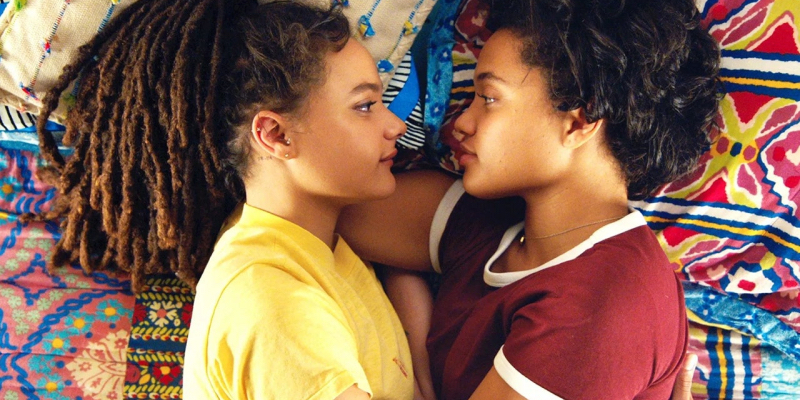
So many coming of age stories about black girls, and about lesbians, so especially about black lesbians, are rooted in trauma. What left me positively enamored about Hearts Beat Loud is that it’s bursting with love, support, and joy. Queer actress Kiersey Clemons lights up the screen as Sam, who’s tackling her last summer before leaving for college and her first real girlfriend, Rose (played by yet another queer actress, Sasha Lane). Their love isn’t marked by parents kicking anyone out of the house, or painful coming out stories. They’re just two weird teenagers who love indie rock music and each other. It’s refreshing, and sweet, and in my mind — a perfect love story, wrapped inside an otherwise imperfect indie film. – Carmen Phillips
41. Summertime (dir. Catherine Corsini, 2015)
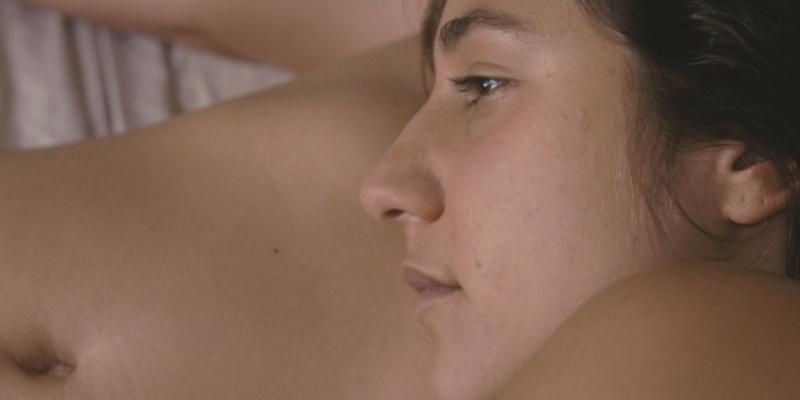
The first time I saw this movie I thought I’d seen a masterpiece. And then I was like wait a minute calm down you’re just horny. Izïa Higelin is one of the hottest people to ever people and watching her fall under the spell of Cécile de France’s confident teacher/activist obviously made me feel things. But maybe that’s enough to qualify it as a great movie! Am I parody of myself that I love the movie about French lesbians bonding over feminism? Yes. But it’s not like the movie isn’t also good in addition to being the best thing ever. It’s gorgeously made and well-acted and does a wonderful job capturing a moment in time and and and – okay fine just let me be horny. – Drew Gregory
40. Dope (dir. Rick Famuyiwa, 2015)
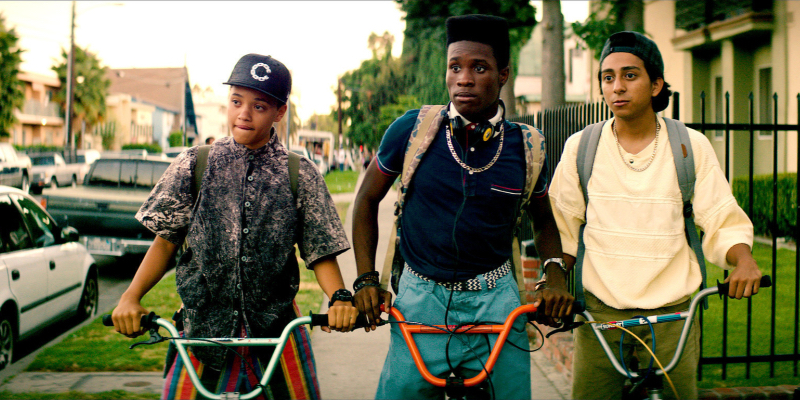
Dope is one of my all-time favorite movies, lesbian or otherwise. It’s one of the tightest scripts of the last decade. The teen heist comedy is unexpected and funny and surprisingly thrilling — which is a lot of compliments from me about a movie with a teenage boy as its protagonist! On top of all those delights, there’s teenage Kiersey Clemons as Diggy, the protagonist’s lesbian best friend. Even at her young age in the film, you can tell she’s already a natural on screen. She steals the camera’s focus without even trying. Also, it’s worth mentioning, the black masc lesbian costume styling in this film? Top notch. – Carmen Phillips
39. The Girl with the Dragon Tattoo (dir. David Fincher, 2011)
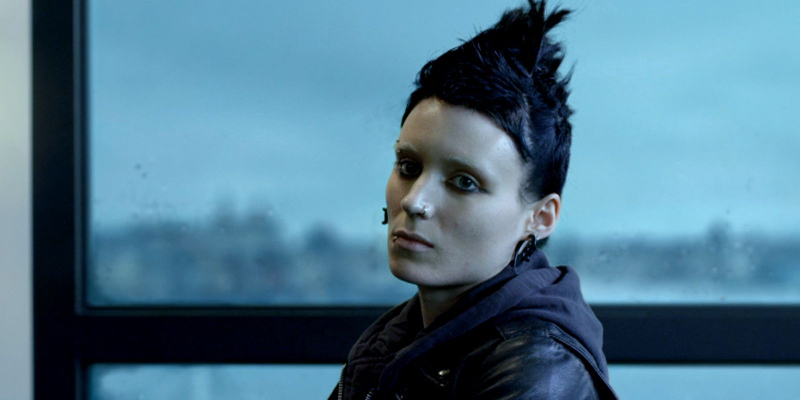
There have been other female action heroes — from Pam Grier’s Foxy Brown to Gal Gadot’s Wonder Woman — but few have captivated audiences quite like Lisbeth Salander. Starting with Stieg Larsson’s opening salvo in the Millenium series to the Swedish film to the 2011 David Fincher adaptation, I’m hard pressed to recall another female action hero that’s generated that much fervor on her own.
Stepping into Lisbeth Salander’s boots is an unenviable task but Rooney Mara rises to meet the challenge. She is astounding as the pierced, bisexual, tattooed hacker recruited by disgraced journalist Mikael Blomkvist (Daniel Craig) into investigating the Vanger family. Fincher’s decision to structure the film into five acts — rather than the usual three — requires Mara to carry more of the film’s load: balancing being the badass who fuels the movie’s action sequences and enigmatic enough to keep your attention during Dragon Tattoo‘s procedural parts. She earned every bit of that 2012 Oscar nomination. – Natalie
38. Eva + Candela (dir. Ruth Caudeli, 2018)
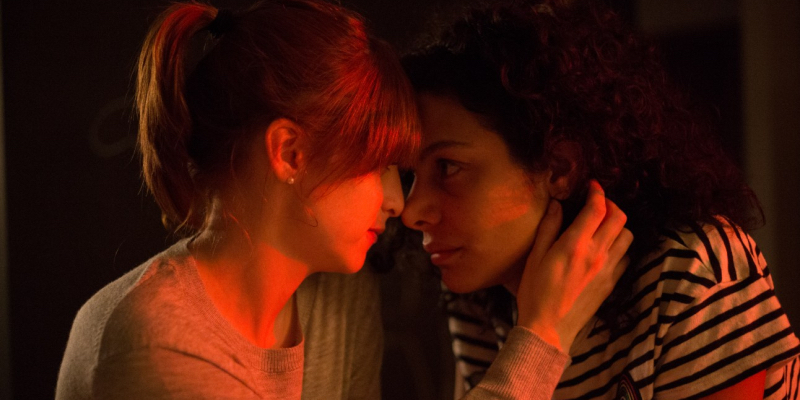
There certainly is no shortage of lesbian romances where things don’t work out – internalized homophobia, externalized oppression, sickness, murder, suicide. But bless Ruth Caudeli’s debut feature for showing our heartbreak the way it usually occurs in all its messy emotions. Most queer women don’t break up because of queerness. Most breakup because God fucking damnit sustaining a relationship – years with another person! years! – is very, very difficult. Silvia Varón and Alejandra Lara are incredible as Eva and Candela as we watch them fall in love and out of love and back in love and out of love, trying so hard to make things work, because they love each other. Truly, they do. It’s a relatable and painful movie that celebrates love in all its impossibilities. And it’s a delightful announcement of a new queer filmmaker who has decades of great films ahead of her. – Drew Gregory
37. Bit (dir. Brad Michael Elmore, 2019)
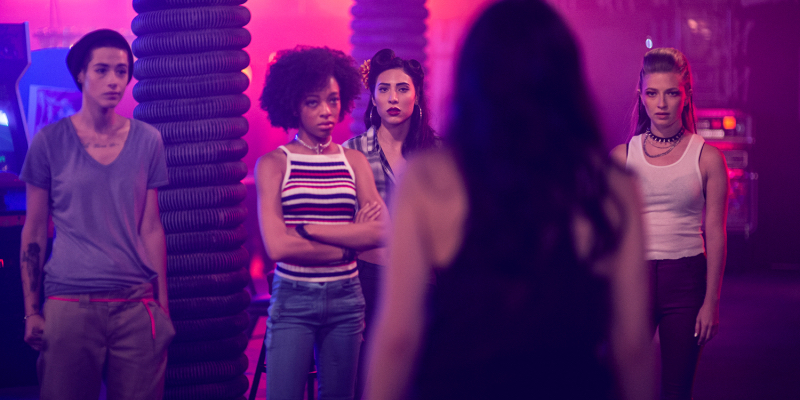
If you’re not a trans lesbian, like I myself am so lucky to be, you may not fully be able to grasp the rarity of this low-key vampire movie. There are only two trans women leads on this list and the other one ends up with a man. While the decade has shown incredible progress for cis lesbians, trans lesbians are still more or less non-existent on our screens. And yet, there is Bit, where Nicole Maines joins a group of lesbian separatist vampires! It’s fun, it’s sexy, and it’s made with a casual touch never weighed down by the uniqueness of its representation. It’s not a perfect movie, but I treasure its existence, and I hope it gets a proper release soon. I’ve never seen my romantic life on a movie screen. Not fully. But there’s a scene in Bit that comes the closest; that doesn’t require me to ignore my transness or my gayness. The only difference between this movie’s meetcute and my own is usually when I kiss someone it doesn’t end with them sinking their teeth into my neck. Usually. – Drew Gregory
36. Hooters! (dir. Anna Margarita Albelo, 2010)
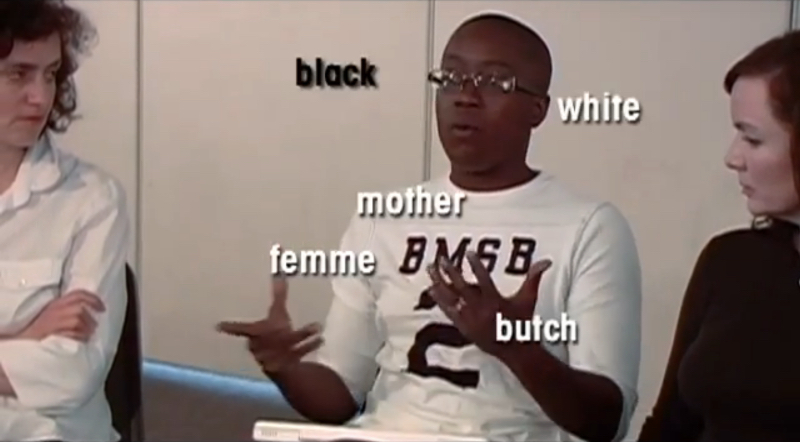
Part behind the scenes featurette, part treatise on the state of lesbian cinema, Anna Margarita Albelo’s making-of documentary about Cheryl Dunye’s The Owls is a remarkable work of art in its own right. With sharp interviews and cinema verité gold, Albelo captures a debate around how we present ourselves as a community. Generational divides abound in discussions of gender, sexuality, and filmmaking. Queer culture shifts so rapidly it’s a treat to have this document of a specific period of time.
After six years way from filmmaking, The Owls was a return for Dunye, an attempt to prove that independent lesbian cinema was still possible in a landscape increasingly focused on respectability. But it’s Albelo’s examination of the moment that proved this to be true. Her signature sense of humor and formal recklessness combined with insight from Dunye, Guinevere Turner, and a very young Rhys Ernst, make for the rare movie about movies that’s really about so much more. – Drew Gregory
35. Lyle (dir. Stewart Thorndike, 2014)
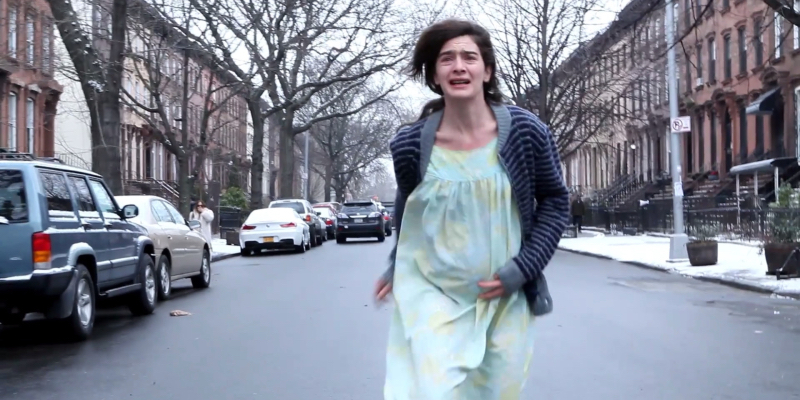
It’s unnecessary to say that Stewart Thorndike’s fierce horror movie is more than its pitch – what if Rosemary’s Baby was gay? It’s unnecessary, because the film doesn’t settle in that premise and it doesn’t go beyond it. Instead it dives deep into the thematic mess that question raises. I’m still not sure what the film is saying, and I’m not sure it’s really saying anything. It’s just asking questions we don’t ask; expressing feelings often left unexpressed. And as an experience it’s an absolute ride. It’s a truly horrifying movie with a desperate central performance from Gaby Hoffman and an ominous supporting performance from Thorndike’s ex Ingrid Jungermann. Stewart Thorndike discussed wanting to make a trilogy of horror movies and I am very upset that she hasn’t been given the money to do so! Somebody give Stewart Thorndike some money! It’s been five years and I want more work from her! Are you, dear reader, a film financier?? If so, give Stewart Thorndike money right this minute! – Drew Gregory
34. Codependent Lesbian Space Alien Seeks Same (dir. Madeleine Olnek, 2011)
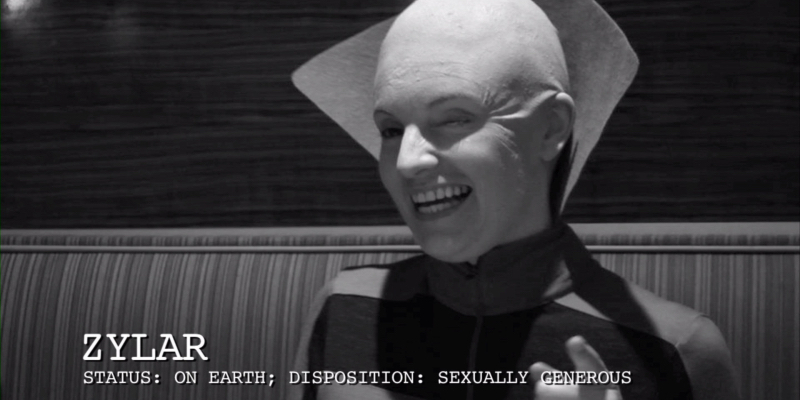
This bizarre and hilarious comedy is a tribute to lonely lesbians across the galaxy. Following the pursuits of three aliens sent to Earth to get their hearts broken so they’ll stop feeling so much, Codependent Lesbian Space Alien Seeks Same is painfully relatable even amidst all its silliness. The movie shows that there’s someone out there for every misfit – you may just have to journey to a new planet to find them. Most of the genre films on this list are not made by queer women, so it’s a delight that Olnek leaned into her budgetary restraints showing all you really need for sci-fi is commitment. And this sure does have commitment! – Drew Gregory
33. In Between (dir. Maysaloun Hamoud, 2016)
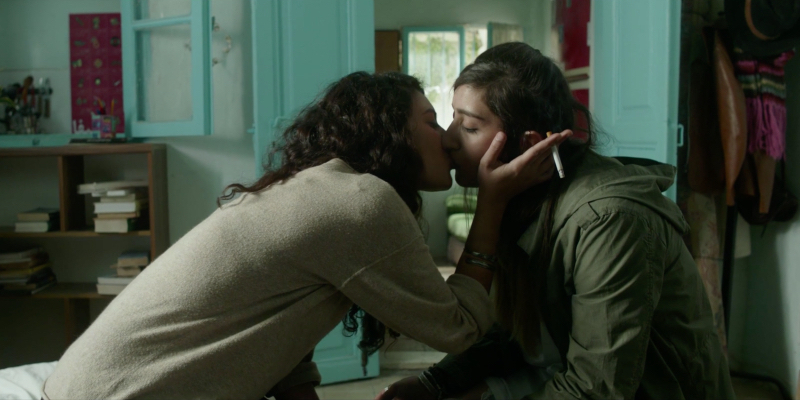
I love this movie with a specific passion even my excitable self rarely feels. There’s just something about its trio of stubborn women – Leila, Salma, and Nour – that feels so familiar to me, facets of my own personality, pieces of others I admire. It’s such a gift to spend time with these people watching them push against their oppression finding love and connection in partners, each other, themselves. The word feminism is thrown around a lot of in film criticism these days, but Hamoud’s film feels feminist in a pure and personal way I rarely see. This is a film about the occupation of Palestine, about patriarchy, about homophobia, and it is a film about surviving. That doesn’t mean simply living through the day – though sometimes that’s certainly all we can manage – but dancing and eating and fucking and loving. Tell the assholes to fuck off and look hot while doing it. Care for each other when it’s all too exhausting. I’m so grateful to Hamoud and the lead actresses – Mouna Hawa, Sana Jammelieh, and Shaden Kanboura – for making such a remarkable film that I’m certain will only grow in esteem in the decades to come. – Drew Gregory
32. Black Swan (dir. Darren Aronofsky, 2010)
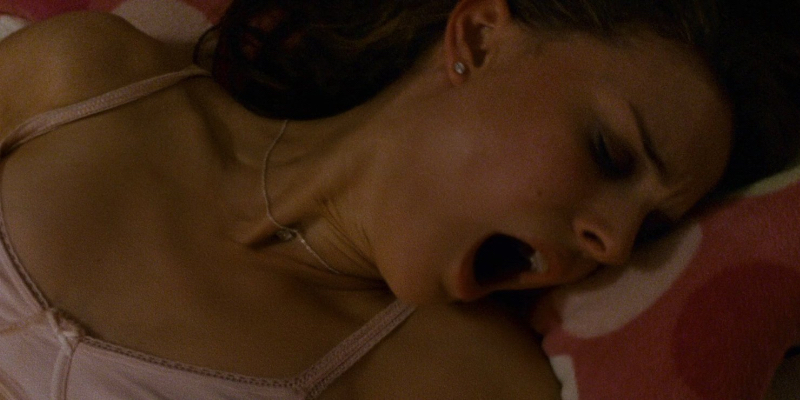
Frenetic yet vulnerable, sexy yet haunting, Black Swan is a nightmarish ballet of mommy issues, power struggles, and polarities. It’s the classical ballet Swan Lake — on poppers. Nina (Natalie Portman) and Lily (Mila Kunis) diverge in their approach to the artform: Nina is too technical and rigid for the likes of choreographer Thomas (Vincent Cassel), while Lily is an unpredictable firecracker. When Thomas intentionally shatters boundaries between the professional and the personal, Nina unravels, unsure of what’s real and what isn’t. Use of the fantastic in the movie is just right — sparse enough to shock but a consistent thread in the movie’s visual storytelling. Some of its more horror-leaning images are the kind that stay with you for years. – Kayla Kumari Upadhyaya
31. Thelma (dir. Joachim Trier, 2017)
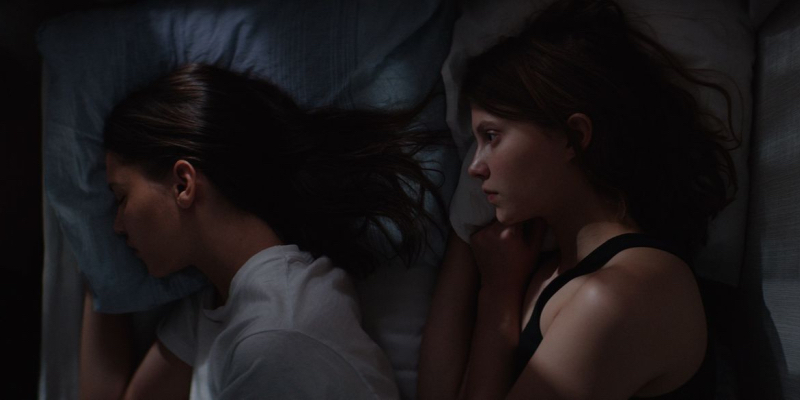
Thelma’s magic lives entirely in its camerawork and editing. Mesmerizing visuals make up for the wobbly plotting and provide a clear throughline. Thelma wraps an X-Men-like narrative in avant-garde horror dressings, and the result is quite lovely. Raised by oppressive, strictly Christian parents, Thelma’s first taste of kindness and acceptance comes from her fellow classmate Anja, whose affection sets off a sexual awakening for Thelma. Her burgeoning supernatural abilities reflect her trauma but also her strength, and there are touches of Carrie throughout the Norwegian-language film. It’s a slow-burn horror about desire and control, and it ends on a very dark, twisty note. – Kayla Kumari Upadhyaya
30. Boy Meets Girl (dir. Eric Schaeffer, 2014)
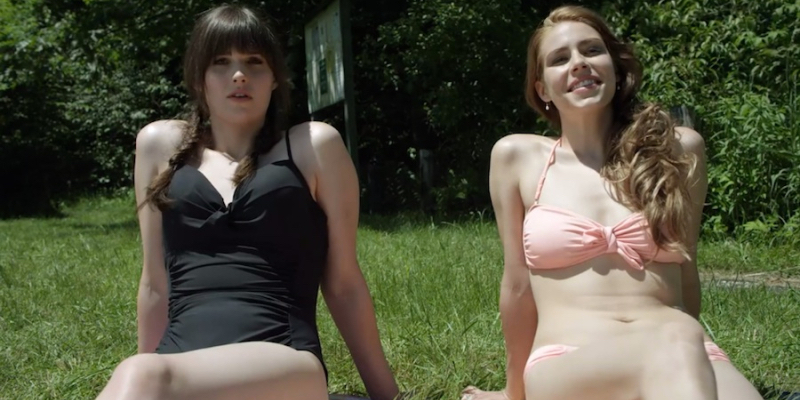
People ask me about dating as a trans woman with a grimace on their face. Their tone – or, on occasion, their words – suggest I might always be alone. This is absurd, of course. Trans women have been desired and loved since we’ve existed which is forever. But it’s true that there are minimal examples of this in media. Looking at the landscape of trans representation – especially in 2014 when Boy Meets Girl came out – one might think we can only be sexless or sex objects.
This is all to say – the saccharine romance of Boy Meets Girl is a fucking gift. I love the messy love quadrangle Ricky gets herself into and I love that it all gets wrapped up in a nice bow. I don’t even mind that she ends up with the boy! Well, I don’t mind it much at least. We still get a sex scene – A SEX SCENE – between Ricky and Francesca that’s sweet and silly and really, really hot. But beyond representation, the movie works as well as it does because Michelle Hendley is an incredible actor. She is a full-on movie star in appearance and charm and endless talent. Considering the number of cis queer women filmmakers who have made work this decade, it’s just a bit disappointing that the only trans women leads on this list were brought to us by two cis straight men. Cast a trans woman in your semi-autobiographical cliché lesbian romcom! I promise you a hungry and grateful audience. – Drew Gregory
29. Signature Move (dir. Jennifer Reeder, 2017)
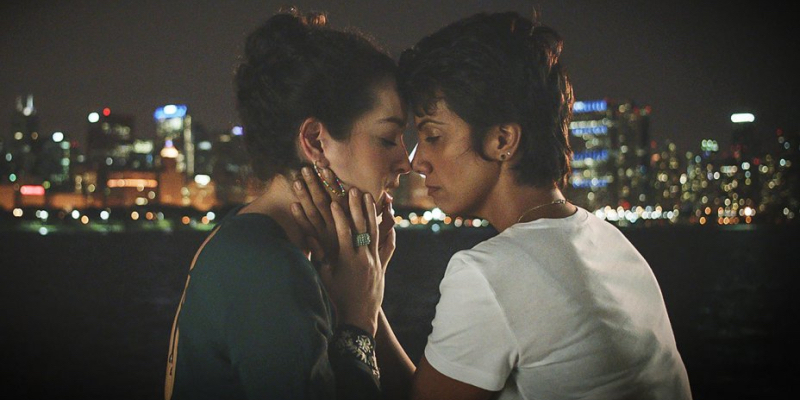
Zaynab, a 30-something Pakistani Muslim lesbian from Chicago who’s been living with and taking care of her recently widowed mother, finds herself falling quickly and unexpectedly in love with Alma — the Chicana bookshop owner whom she meets one night at a bar. Of course, Zaynab’s mother doesn’t even know she’s gay, and Alma has little interest in dating someone in the closet, so complications arise almost right away. There’s a lot about this movie that sounds predictable when you write it down, but on film it’s captivating. A lot of that has to do with not only the cultural authenticity and attention to detail, but also Zaynab’s personal obsession with Lucha-Style Mexican wrestling. I promise you’ve seen nothing like it. (Oh by the way, it was made by lesbian Pakistani filmmaker Fawzia Mirza, so when I say that authenticity and unexpected voice is at the core of this film, I absolutely really mean it.) – Carmen Phillips
28. Daddy Issues (dir. Amara Cash, 2018)

There is an unlikely love triangle at the center of Amara Cash’s debut – a young artist, her influencer crush, and the influencer’s drug-addicted sugar daddy. But that’s only the beginning. This is a bonkers movie filled with bright colors, pop montages, and ever-heightening emotion. It also happens to be one of the most adorable movies on this list. That’s right, amidst all the insanity, and all the sex, is the story of a young woman trying to find herself amidst first love. Sweet doesn’t have to mean safe. Sweet doesn’t have to mean respectable. Straight people don’t get to determine how we tell our stories and it’s a pleasure to watch Cash’s declaration of this fact. A first kiss can be magical. But so can a first fingering. – Drew Gregory
27. A Date for Mad Mary (dir. Darren Thornton, 2016)
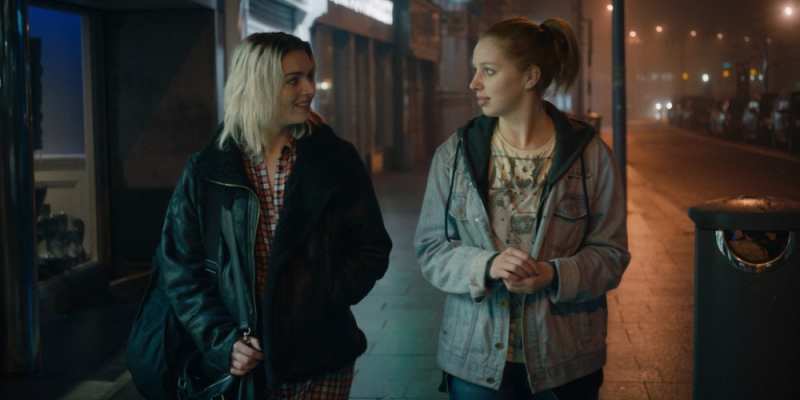
If you combined all my adolescent crushes into two people it would be A Date for Mad Mary romantic leads Seána Kerslake and Tara Lee. But that’s not the only reason I love this Irish romantic dramedy. I love this movie for its heart and its humor and its totally fresh take on the in love with your straight best friend trope. Kerslake’s titular character has no idea she’s in love or that she’s even queer. She just thinks she’s frustrated with her soon-to-be-married friend Charlene for being so absent, especially when Mary just spent months in prison. The fact is Mary doesn’t know who she is. She doesn’t know why she’s so angry, why she keeps fucking up and hurting people, and why she can’t find a date to this wedding. It doesn’t all come back to her queerness – but a lot of it does.
Enter videographer/singer Jess. The chemistry is immediate and even if she’s not sure why, Mary just really likes being around her. Unfortunately, Mary keeps going back to Charlene. Mary’s growth throughout the movie is strained and troubled, but Kerslake finds nuance in every moment. Mary becomes an easy character to root for even if you aren’t painfully attracted to her – which, again, to clarify, I am. – Drew Gregory
26. Shakedown (dir. Leilah Weinraub, 2018)
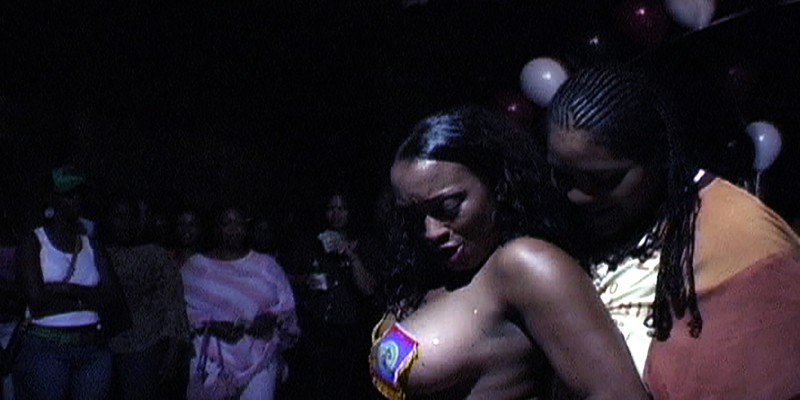
Shakedown is a documentary exploring early-aughts Los Angeles via the lens of the underground black lesbian strip club from which the film gets it name. For a documentary, which is a genre most often associated with dry facts on screen, it’s also deceptively seductive — playing with the same pulls of fantasy that dancers are also selling to their customers. It’s so incredibly sexy and you can’t take your eyes off the line up of both femme and stud performers on stage (or their lives behind the scenes once the music stops playing.) – Carmen Phillips
25. Bessie (dir. Dee Rees, 2015)
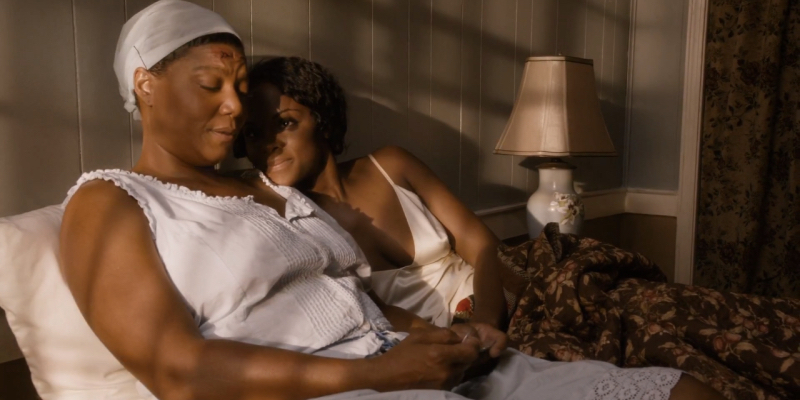
In 2002, Queen Latifah scored her first Oscar nomination for her turn as Matron “Mama” Morton in the film adaption of Chicago. For someone who had, until then, built a career primarily on sitcoms and an eponymous talk show, the Supporting Actress nod highlighted that Latifah was capable of so much more. In the years since few movies have given Latifah the opportunity to earn that critical acclaim but Bessie did. Latifah embodies blues legend, Bessie Smith, in some of the best work of her career…and for it, she earned an Emmy nomination (Best Actress in a TV Movie) and her first Emmy win (Best TV Movie).
Bessie is rare in its depiction of sexuality: showcasing both Bessie Smith’s bisexuality and polyamory and Ma Rainey’s (played by a scene stealing Mo’Nique) unapologetic lesbianism. – Natalie
24. Valencia (dir. various, 2013)
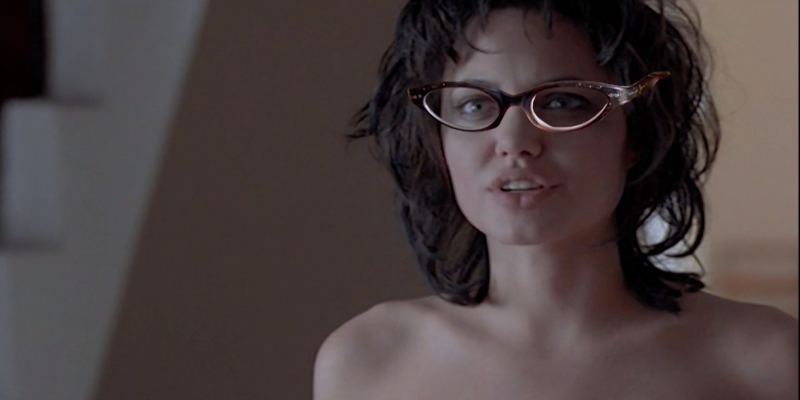
Billed as a “collaboration between a national community of queer filmmakers” this omnibus adaptation of Michelle Tea’s novel is one of the queerest, transest movies you’ll ever see. Produced by Clement Hil Goldberg and including directors such as Cheryl Dunye, Jill Soloway, and Silas Howard, this movie is the cinematic equivalent of a co-op. Every take on Tea’s work is so different, yet the sections complement each other so well. “Michelle” is played by a variety of cis women, a trans woman, a trans man, an animated character, and even Angelina Jolie in Gia but with Tea’s signature glasses superimposed. There’s a reckless freedom – a fluidity to gender and sexuality and art – that makes this a landmark work of queer cinema. — Drew Gregory
23. Disobedience (dir. Sebastián Lelio, 2017)
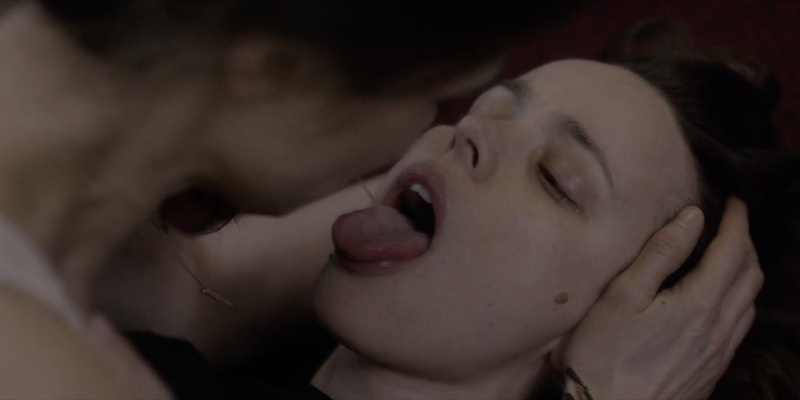
A quiet contemplation of faith, desire, and community, Disobedience looks at the disparate ways childhood lovers Esti (Rachel McAdams) and Ronit (Rachel Weisz) contend with the expectations forced on them in their Orthodox Jewish upbringing. Ronit left, and Esti stayed, and when a funeral brings Ronit home, she’s forced to face the ways she hurt those she left behind and grapple with why Esti remains. The reunion of two lovers sparks scintillating chemistry that is full of familiarity and a long history of emotions. Yes, the spitplay is hot, but the specific way it happens indicates that this is far from the first time it has happened, which makes it all the hotter. – Kayla Kumari Upadhyaya
22. Circumstance (dir. Maryam Keshavarz, 2011)
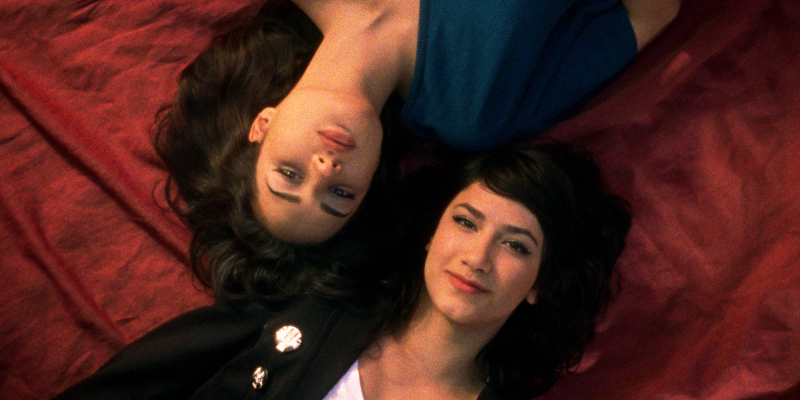
By the time I watched Nikohl Boosheri’s breakout role, I’d already fallen in love with her twice. First, in Meera Menon’s Farah Goes Bang where she plays a woman trying to lose her virginity on the John Kerry campaign trail, and then on the first season of The Bold Type where she plays the devastating Adena El-Amin who yanks Kat Edison out of the closet. There’s something about the easeful way Boosheri can alternate between seductive seriousness and goofy charm that is frankly cruel when paired with her physical beauty. Woah. Okay. I really must apologize to Maryam Keshavarz for getting too distracted by my horniness to give this legitimately masterful work of cinema its proper praise. But you know what? I don’t think she’d mind. Because one of the reasons Circumstance is so great is that even though it’s telling the harrowing story of homophobic oppression in contemporary Iran it never shies away from being sexy. The contrast Keshavarz is drawing between her characters’ private life and public life – the life they want versus the life they’re forced into – is emphasized by sex. It’s important we feel their intense want for each other, so it’s not merely theoretical when it’s taken away. Boosheri and her co-star Sarah Kazemy are so incredible and so beautiful and so electric together, it’s painful to watch them pulled apart. But more importantly does anyone know if Nikohl Boosheri is queer IRL and interested in dating a trans writer with curly hair and an encyclopedic knowledge of film? Asking for a friend. – Drew Gregory
21. Mosquita y Mari (dir. Aurora Guerrero, 2012)
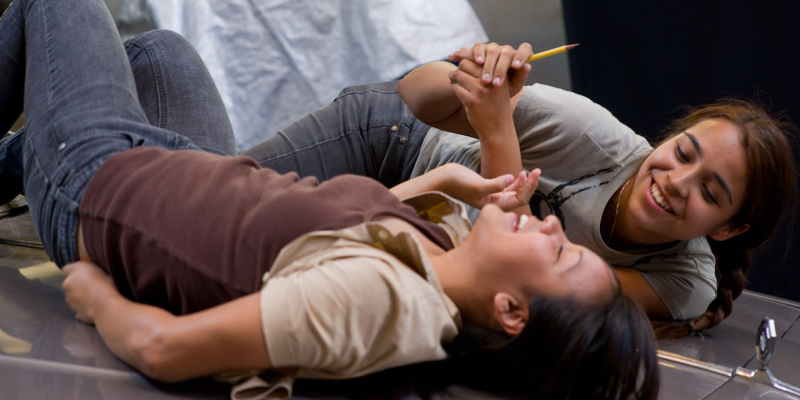
Mosquita y Mari is such a sweet retelling of kind of the romantic friendships that any nerd who’s ever had intense feelings towards “the bad girl” at school that you couldn’t quite explain, but consumed you nonetheless, will instantly relate to. Two Chicana high schoolers, Mari (Venecia Troncoso) and Yolanda (Fenessa Pineda), form a bond that’s more than friendship, but also stretches beyond the vocabulary they have at the moment for girlfriends or queerness. What makes Mosquita y Mari stand out is not only how authentic it is to Latinx and Chicanx families and coming of age (though that is a big part of it) — but also how the film finds a way to explore a queer teen romance that’s slippery and ambiguous. Not all of us come out clearly or in a “straight” line, Mosquita y Mari captures that experience like few others can.– Carmen Phillips
20. Blockers (dir. Kay Cannon, 2018)
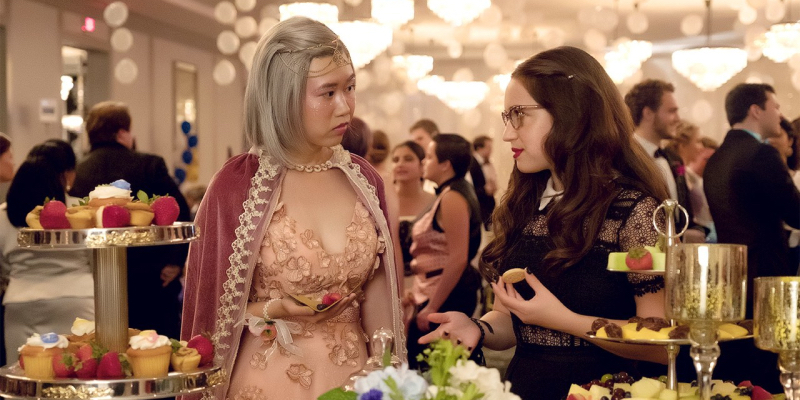
Blockers is a prime example of a movie harmed by the initial reactions to its promos, which made it seem like a sex-negative comedy about parents attempting to make sure their teen girls never have sex, when in reality, the film is the ideological opposite of that. Yes, these parents are overbearing, but the movie is critical of that, creating complex, convincing arcs for each of the parents as well as the teens. Its coming-out story is cute and grounded, featuring a very sweet father-daughter scene, supportive friends, and nerdy romance. The whole cast is great down to the tertiary characters. – Kayla Kumari Upadhyaya
19. A Simple Favor (dir. Paul Feig, 2018)
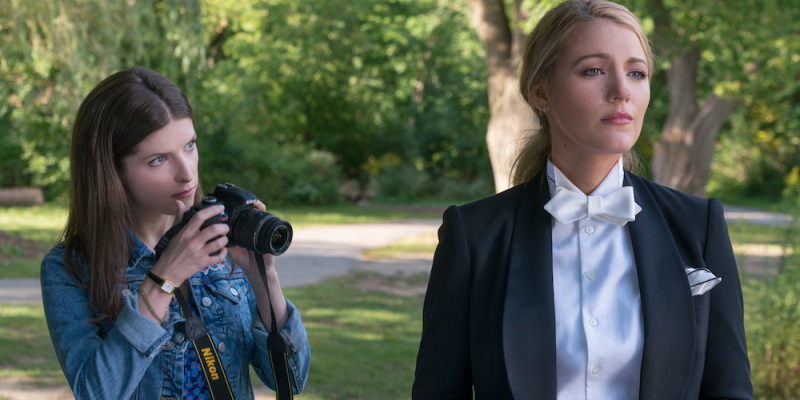
I saw this movie late and was so sure it had been hyped up by my friends to be gayer than it actually was so I was absolutely delighted to learn that it’s actually quite gay and not just in a “Blake Lively in a tux reminded me what being gay is all about” way. It of course was extreme and campy and truly wild but it was kind of the perfect metaphor for that feeling you get when you’re first realizing you’re into girls but can’t tell if you want to be her or date her or both and your brain is in an action movie while your heart is in a romance and you forget which way is up. – Valerie Anne
18. Booksmart (dir. Olivia Wilde, 2019)
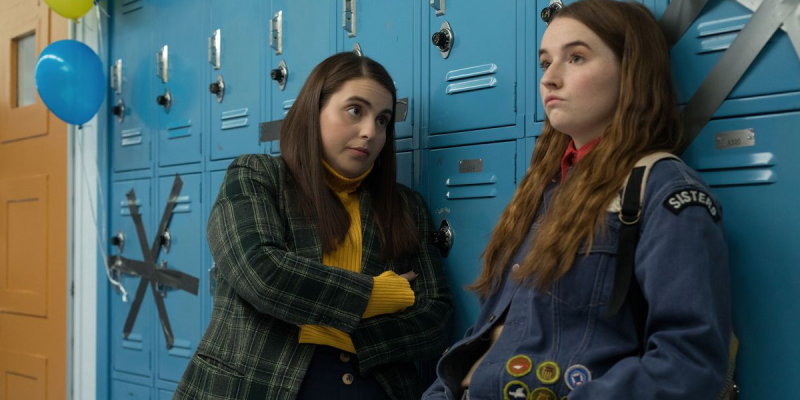
Booksmart is the buddy comedy I never knew I always wanted. Two teenage girls who love each other and are weird and goofy and smart and who aren’t fighting over boys or an mis-overheard sentence or a rumor. It was fun and funny and emotional and gay in that real, awkward, funny way that gayness sometimes is. I don’t remember the last time a movie made me laugh that hard for that long, and it’s always refreshing to watch female friendships that are so obviously and refreshingly written by women. – Valerie Anne
17. Rafiki (dir. Wanuri Kahiu, 2018)
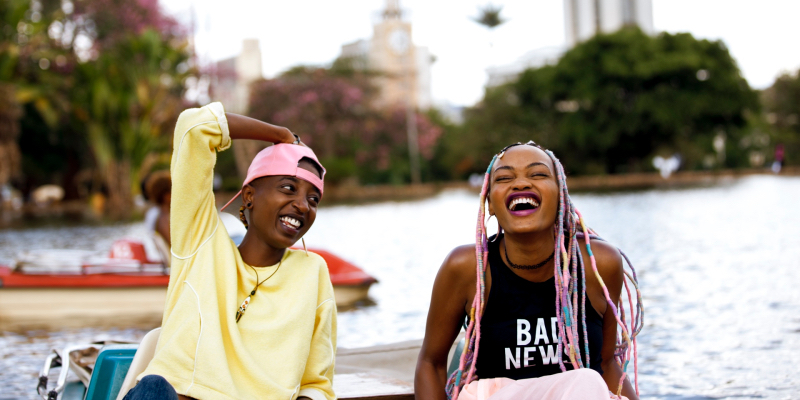
In her 2017 TED talk, Rafiki‘s future director, Wanuri Kahiu, ushered in a new genre of African filmmaking called “AfroBubbleGum.” She had grown tired of African films that dealt with the war, poverty, devastation and AIDS; instead, she wanted to “curate, commission and create art that celebrates fun, fierce and frivolous Africa.” A year later, her film Rafiki — the incredible adventure of two Kenya girls in love, if you will — became the first Kenyan film to screen at the Cannes Film Festival.
Even as the film grapples with Kenya’s homophobia, both on-screen and off, Rafiki fulfills Kahiu’s promise. AfroBubbleGum seeps out through the film’s use of bold color — watch the progression of pink! — and a vibrant soundtrack. But Rafiki‘s ultimate strength lies in its stars, Samantha Mugatsia and Sheila Munyiva, who are magnetic as Kena and Ziki. – Natalie
16. Suicide Kale (dir. Carly Usdin, 2016)
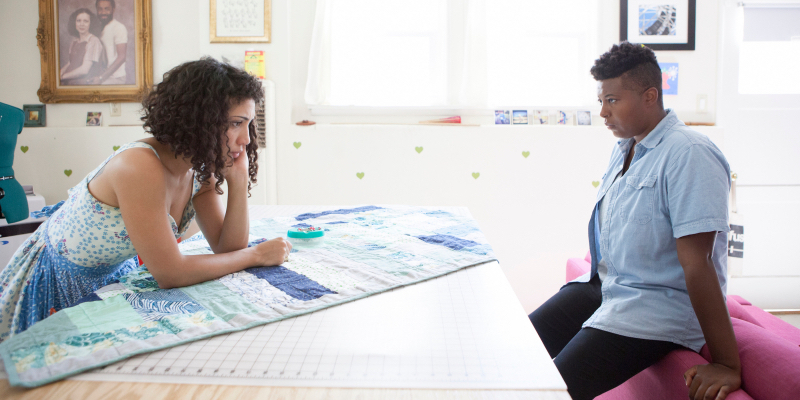
A dark comedy filmed in natural light, Suicide Kale is queer in its marrow, centered on two queer couples at different stages in their relationships and made by a team of queer creatives (Brittani Nichols penned the very funny, natural script, and Carly Usdin directs). It takes place over the course of just one home meal, but the suicide note its title references unearths relationship drama, tension, and complicated emotions that give way to a larger story about intimacy and trust. It feels special from start to finish. – Kayla Kumari Upadhyaya
15. Princess Cyd (dir. Stephen Cone, 2017)
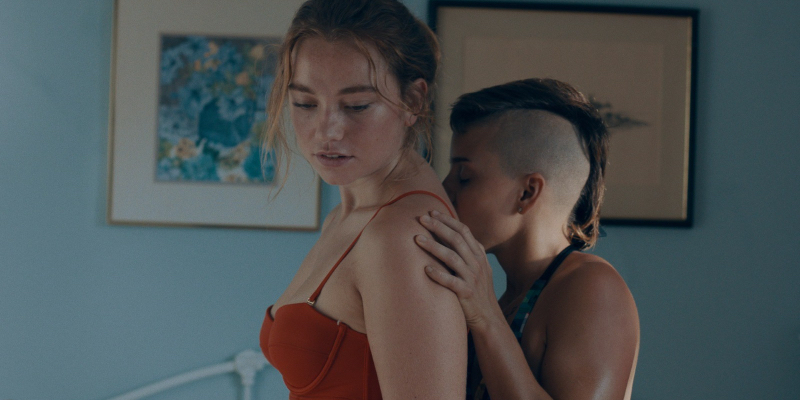
The first time I watched Princess Cyd I watched it again a few hours later. My girlfriend at the time got home from work and I was bursting with a certain chaotic enthusiasm anyone who knows me knows too well. I insisted it would just be easier to show her than try and articulate why I’d fallen so deeply and completely in love with this movie. So we watched it! And she understood! How could she not? Because Princess Cyd is so, so good.
The mostly non-existent plot is Cyd decides to spend a summer with her novelist aunt Miranda. As she explores her casually pansexual desires – most significantly with hottie barista Katie – she also reflects on the memory of her mother and learns to respect Miranda’s less sexual approach to life. The experience of watching the movie is like being invited to one of Miranda’s living room readings. The experience of watching the movie is like being a part of one of Cyd’s trysts. The experience of watching the movie is like remembering the best summer of your life that you didn’t even realize was the best summer of your life until years later you think back on a small moment that shouldn’t mean much and realize it means everything. Every time I open Netflix I hover the cursor over Princess Cyd tempted to sink back into its world. After texting one friend about this movie for the millionth time she said: “I feel like instead of an eternal flame at your grave should just be a speaker of your voice wailing PRINCESS CYD IS SO GOOOOOD on repeat. Forever.” Add it to my will. – Drew Gregory
14. The Favourite (dir. Yorgos Lanthimos, 2018)
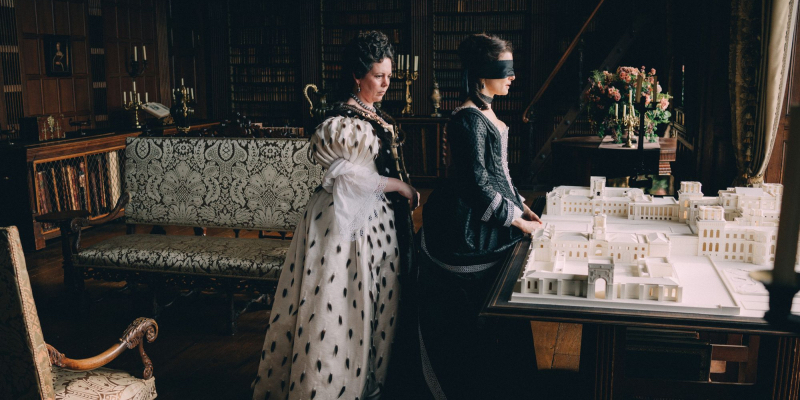
After I saw The Favourite for the first time, I spent the next 24 hours asking myself what in the world I’d watched. I don’t just mean director Yorgos Lanthimos’ surreality and fishbowl lenses that have been discussed at length by straight critics everywhere for the last two years. I mean also, “Did I just witness both Rachel Wesiz and Emma Stone fingerbang the Queen of England?” (Yes, and not even, in my opinion, in their best ever gay roles.) The other thing that really sets this period piece apart is how damn messy all three of its leads are. Lady Churchhill, Abigail, and The Queen herself. But even their nastiest actions are clearly motivated by a desperation to survive in a world that would otherwise strip them of all agency and leave them powerless and penniless. Lanthimos resists the seemingly collective urge of all male writers and directors to justify any of of his female characters’ worst behavior, or to punish them for it. No one even gets assaulted. He showcases the full humanity of three entire queer women who fuck and fuck over each other, and aren’t sorry about it. It seems so simple, yet remains revolutionary. – Heather Hogan
13. Mommy is Coming (dir. Cheryl Dunye, 2012)
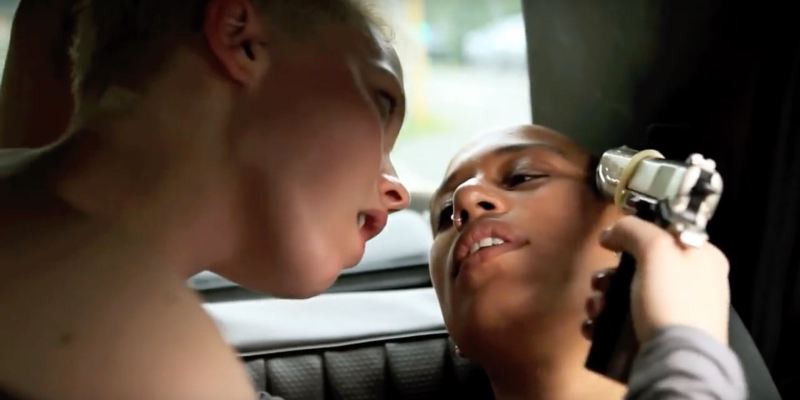
Dubbed the most heterophobic movie of all time by, well, me — Cheryl Dunye’s most recent feature film is a farcical odyssey through contemporary Berlin. With an irreverent sense of humor and committed sense of place, Dunye’s film (co-written with Sarah Schulman) is a sexy and silly good time. It’s a celebration of queer sex in all its forms and a thrilling reminder of Dunye’s importance to queer cinema and cinema in general. It begins with a condom covered gun, ends with some accidental incest, and stops at a sex club along the way. Mommy is Coming is a declaration that queer cinema doesn’t have to assimilate. There’s still a need for work that’s bold and reckless and made just for us. – Drew Gregory
12. The Daughters of Fire (dir. Albertina Carri, 2018)
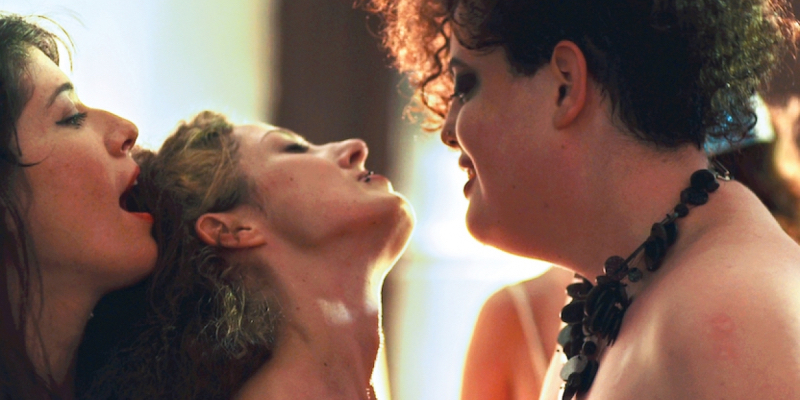
This exploration of the possibilities of pornography answers its own question. Can porn be truly feminist and truly queer? Yes, of course, and this movie is proof. Mostly plotless, this road movie through Argentina follows a lesbian couple as they add more and more queers to their traveling gang of lovers and friends. The cinematography is gorgeous. The narration is poetic. The sex is real and kinky and inclusive. It can be watched in a theatre as a work of art and it can be watched at home to get you off. It’s a treat to live in its utopic vision of queer community and pure desire. – Drew Gregory
11. Second Star on the Right (dir. Ruth Caudeli, 2019)
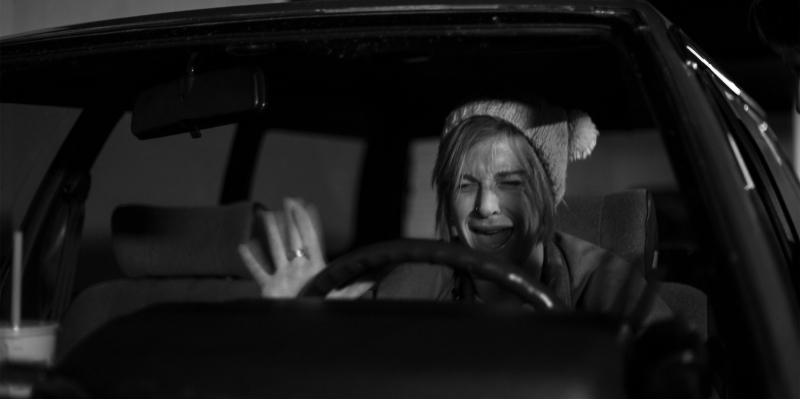
If Ruth Caudeli’s debut Eva + Candela (#38!) showed the promise of a great new filmmaker, her second film – a mere one year later – has the confidence of an artist fully formed. This story of an immature bisexual surrounded by rapidly maturing straight friends is bursting with formal experimentation. There is so much queer creativity in every frame illuminating Emilia’s inner life and various struggles. The black and white cinematography is subtly crafted and the moments of color are magnetic. Silvia Varón – Caudeli’s muse and, based on Instagram, IRL girlfriend – is so fucking good as Emilia. She’s hilarious and painful and always manages to keep us on her side. This is a messy movie in character and plot and style, but I say that as a compliment. Caudeli commits to the mess of her heroine and respects the messes we all sometimes make of our silly queer lives. – Drew Gregory
10. The Miseducation of Cameron Post (dir. Desiree Akhavan, 2018)
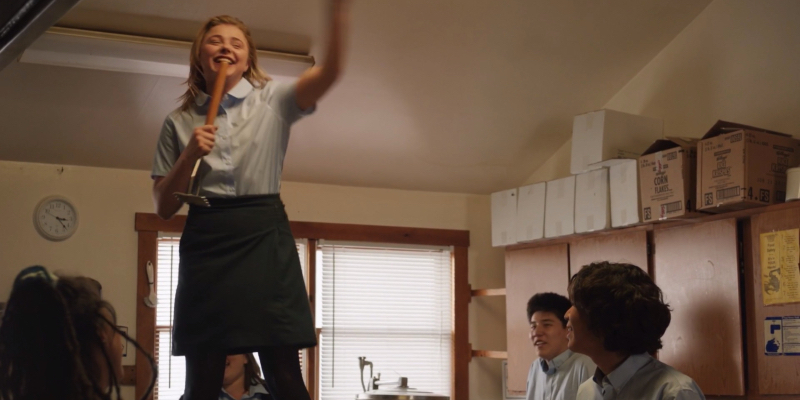
Instead of simply filming Emily M. Danforth’s sprawling novel, Desiree Akhavan created a true adaptation – focusing on the second half, changing the ending, still capturing its essence. Like its source material, Akahavan’s film uses the story of a teen girl’s time at conversion therapy as a larger exploration of the way queer people are brainwashed to doubt our feelings. The headstrong Cameron – an incredibly dykey and just plain incredible performance from Chloë Grace Moretz – is a perfect protagonist as we watch her slowly start to lose a grasp on her reality. Aided by Ashley Connor’s cinematography and Julian Wass’ score, Akhavan’s film is a truly cinematic experience, never afraid to let a moment or an image sit. The sex scenes are long and specific, reminding an audience just how different it is to watch a queer woman coming-of-age movie made by an actual queer woman.
Also the movie is really funny! Is it a serious drama about queer self-hatred? Yes. Does it still have Akhavan’s biting sense of humor? Also, yes. It’s not maudlin. It shows how queer people, even in our lowest moments, find community and joy, make jokes about our oppressors, and keep on going to live another day. – Drew Gregory
9. Good Manners (dir. Juliana Rojas, Marco Dutra, 2017)
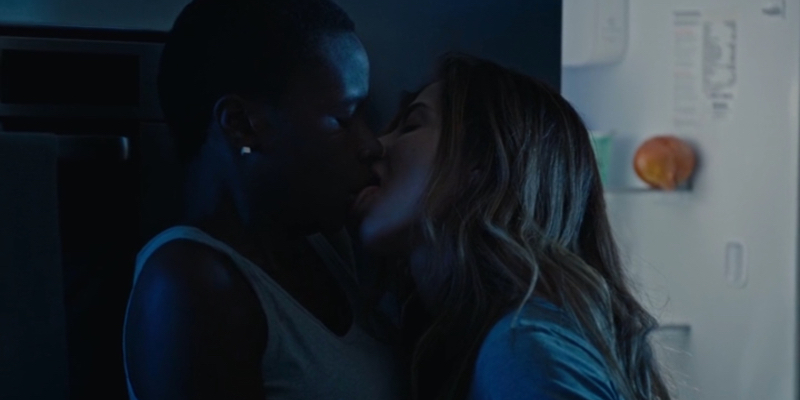
Horror-camp and relationship drama collide in this Brazilian movie that takes its sweet, sweet time building its world and mythology. But that character development and languidity is a welcome change of pace and stakes for what is ultimately a monster movie. Good Manners suffuses that genre with feelings as well as commentary on class, motherhood, and queerness. Isabél Zuaa’s quiet but memorable performance as Clara, a nanny for a rich and famous pregnant woman who she starts a relationship with, is the movie’s backbone, but Good Manners also manages to tackle a lot at once, including a coming-of-age story for its young boy Joel. It’s more complex than the average monster movie, but it also hits all the right notes of the genre with gore and frights. – Kayla Kumari Upadhyaya
8. Certain Women (dir. Kelly Reichardt, 2016)
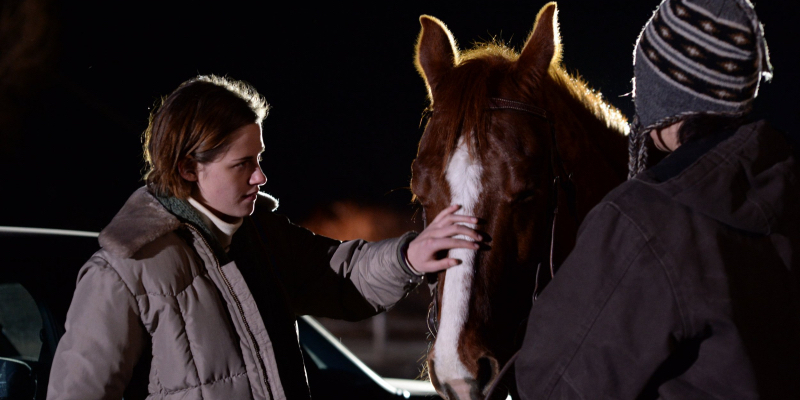
Based on three short stories by Maile Meloy, my favorite of Kelly Reichardt’s many quiet American masterpieces is a tribute to stubborn women. The sections starring Michelle Williams and Laura Dern are heartbreaking and beautiful, but it’s the third section starring Kristen Stewart and newcomer Lily Gladstone that makes me want to scream or crawl within myself and implode. Gladstone plays Jamie, a ranch hand who stumbles upon the law class being taught by Stewart’s Beth. Despite having no interest in law, Jamie keeps returning to this twice a week class to spend time with Beth. It’s less a romance and more a crush. It’s a less a crush and more a window into possibility. Jamie is living an isolated life where she’s surrounded by more animals than people. And the people she does interact with are certainly not queer – and certainly not Kristen Stewart. Of the three women in this movie Jamie is the least outwardly confident. In fact, she’s rather timid. But there’s something about Beth that drives her out of herself and pushes her to take risks and it’s thrilling to witness. This is a melancholy film, but it’s also a celebration of our tiny triumphs, our attempts at something more. – Drew Gregory
7. Dirty Computer (dir. Janelle Monáe and others, 2018)
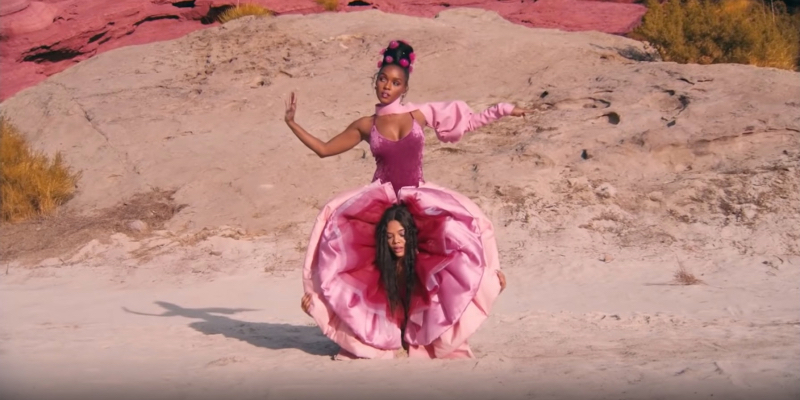
Janelle Monáe has always integrated science-fiction into the stories she tells in her music — dating back to the release of Metropolis: The Chase Suite, released in 2007 — but with the release of Dirty Computer, she took things to a whole new level. With her “emotion picture,” Monáe created a visual compliment to her GRAMMY nominated album, that was a part Westworld, part Eternal Sunshine of the Spotless Mind, part The Handmaid’s Tale and part THX 1138.
But the veneer between science fiction and reality has never felt thinner. In the world Jane 57821 roams and the one where Janelle Monáe lives as a queer black woman, there is a concerted efforts to erase the things that make us “dirty.” Dirty Computer is a call to resist the cleanse and to fight to be “free-ass motherfuckers.” – Natalie
6. Carol (dir. Todd Haynes, 2015)
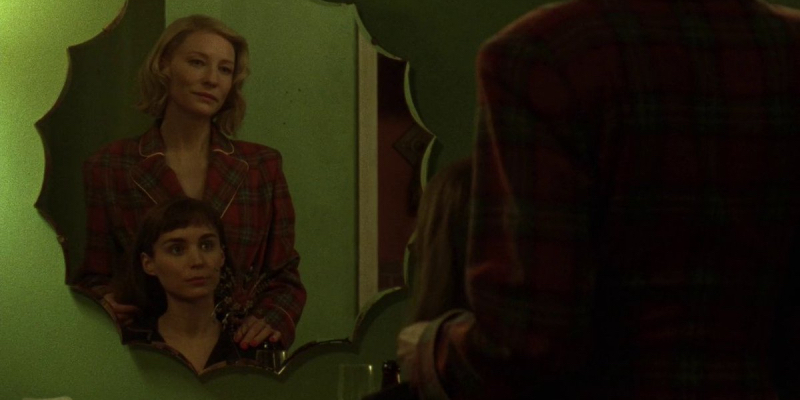
We’ve written more about Carol than any movie ever, and I’d venture to say that the internet at large has written more about Carol than any other lesbian movie ever — yet, somehow, I still cannot believe it exists. You can (and plenty of people do) disagree with me, of course, but I think it’s perfect. I think it’s a perfect film. Here’s a thing a lot of people don’t know: There’s a scene in the script in act one where Therese gives Richard a handjob. Director Todd Haynes did film it, but decided to cut it in editing — because he didn’t want the pleasure of a man to be the center of any experience Therese or Carol have in the movie. And that’s the real delight of the entire thing for me. Yes, it’s a brilliantly filmed and acted story about embracing who you are and the danger and ecstasy of giving into queer desire, but it’s also a story that relentlessly, mercilessly shoves men out of the frame. It invites the audience not to ignore them, but to laugh at them. At the end of the day, that’s why Carol didn’t win any Oscars. “Do you miss Richard?” Carol asks. Therese almost giggles. “…no. I haven’t thought about him all day.” – Heather Hogan
5. Professor Marston and the Wonder Women (dir. Angela Robinson, 2017)
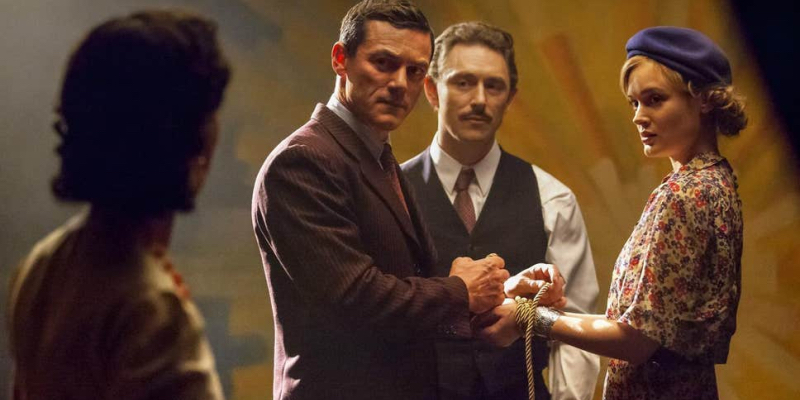
This movie is one of the most stunning movies I’ve ever seen. It’s a celebration of women and breaking the mold and daring to love. It’s heartbreaking and heartwarming and a true celebration of the love between three people in a casual and understanding way. I had heard that Professor Marston was in a polyamorous relationship with the women who inspired the comic but I’ll be honest, I thought the movie would maybe hint at it or mention it in passing; instead, it was the entire heart of the movie. It was dramatic and artistic and smart and also I learned things about science AND about Wonder Woman which really is my nerdy dream come true. I cannot recommend this unexpectedly unabashedly queer movie enough. – Valerie Anne
4. Portrait of a Lady on Fire (dir. Céline Sciamma, 2019)
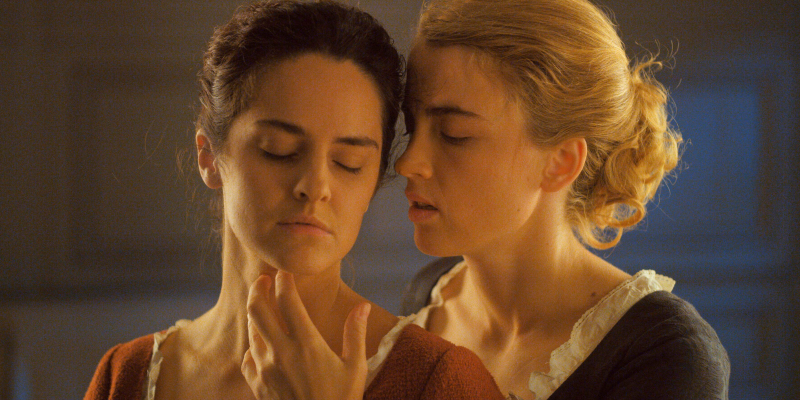
Before I came out, my lesbian viewing was restricted to films I could reasonably watch under the guise of cinephilia. It’s how you end up a scholar of queer film history before ever seeing an episode of The L Word. When Céline Sciamma’s debut film Water Lilies was released I wasn’t sure which category it fell into. The trailer was so completely gay – teenage girls kissing in between synchronized swim routines – but it was beautifully shot and in French so I convinced myself I could watch it. I was enthralled by its cinema. I was enthralled by its queerness.
Ten years later – my obsession growing with her next two films Tomboy and Girlhood – Sciamma created a film that once again stunned me as both a work of cinema and a work of queerness. There is no filmmaker around today with a greater grasp of cinematography than Céline Sciamma. While less flashy than some of the other greats, Sciamma always knows exactly where her camera should land – how the images can best bring out the truth of her characters. Portrait of a Lady on Fire is about the creation of lesbian art and it is itself a remarkable work of lesbian art. There can be no arguments made against its cinematic importance and I hope some closeted cinephile in some far off suburb will lose her fucking mind watching Noémie Merlant spit water into Adèle Haenel’s mouth. – Drew Gregory
3. Appropriate Behavior (dir. Desiree Akhavan, 2014)
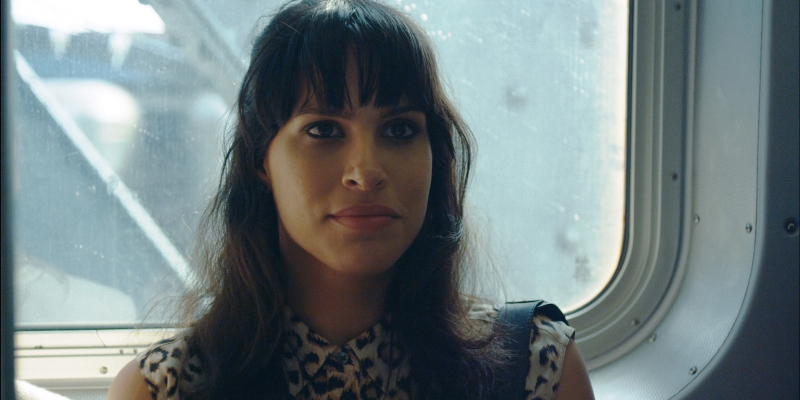
Desiree Akhavan wrote, directed, and stars in this edgy hipster comedy, playing her own version of the Brutally Honest Misanthropic Anti-Pixie Daydream Girl. She vacillates from hyperbolic-but-relatable despair to Ilana Wexler-esque repellant charm. It’s quirky, funny, and delightfully indie, chock-full of the inside queer jokes she’d later employ so well in The Bisexual. Since the release of this film, Akhavan has emerged as one of the most compelling and original voices of her generation, committed to authentic, unsparing portraits of queer millennial life. – Riese Bernard
2. The Handmaiden (dir. Park Chan-wook, 2016)
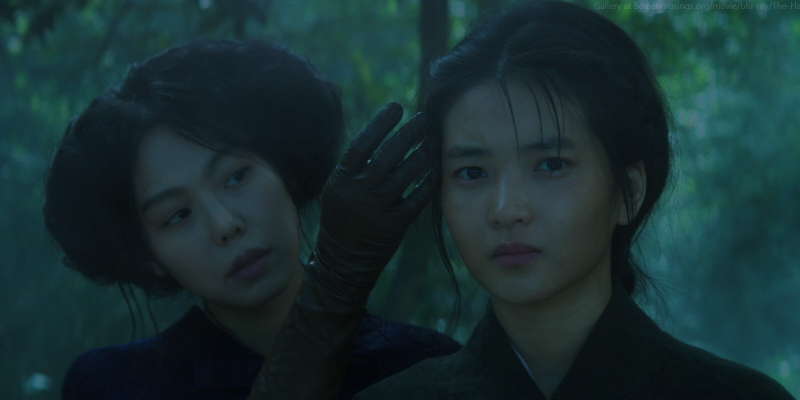
Park Chan-wook’s erotic psychological-thriller-meets-heist-movie based on the novel Fingersmith by Sarah Waters is a feat in measured but stylish storytelling. It’s violent and sexual, but those aspects of its narrative speak to larger themes and the immersive visual landscape of the tale so that there isn’t a moment of the movie that feels gratuitous. It shocks without that being all it’s trying to do. Because ultimately, these are very real characters ensconced in a very real love story. Revenge and romance are driving forces for the movie’s action, and several scenes teeter on the edge of desire and danger. – Kayla Kumari Upadhyaya
1. Pariah (dir. Dee Rees, 2011)
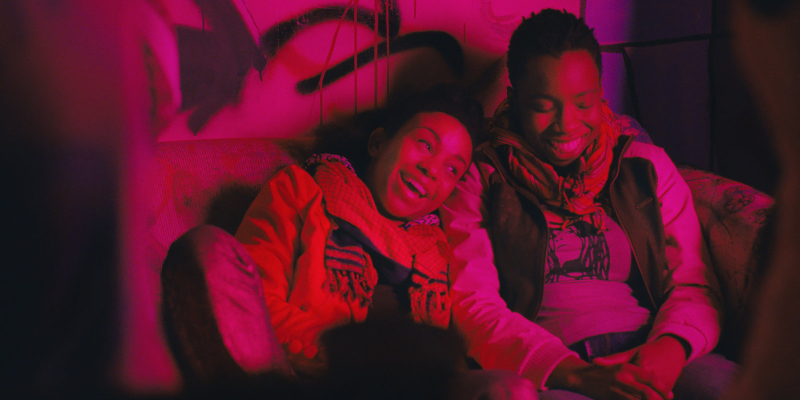
Back in 2018, still basking in the glow of Moonlight‘s upset of La La Land for the Best Picture Oscar, famed lesbian author Jacqueline Woodson asked Lena Waithe if she thought we’d ever have a “lesbian Moonlight.” Waithe quickly points out that we’ve already had one: Dee Rees’ stunning coming-of-age and coming out drama, Pariah. But like its central character, Alike, Pariah found itself adrift in a world not yet ready for its honesty.
Adepero Oduye astounds as Alike, the 17-year-old who navigates her identity along a Brooklyn bus route: literally shifting from the conservative, feminine girl her mother loves to the masculine-of-center woman who loves other women, as she makes her way across town. Pariah is, at times, painful to watch — in the way that things that feel too true usually are — but optimism persists throughout. – Natalie
Chloe Grace Moretz And Sasha Lane Are Playing Gay In The Movie Adaptation Of “The Miseducation of Cameron Post”
Emily Danforth’s The Miseducation of Cameron Post is one of the best queer YA novels ever written. We’ve talked about it a lot here on Autostraddle, so I’m very excited to say that it’s coming to the big screen with big name talent attached! According to the Hollywood Reporter, Chloe Grace Moretz, star of movies like Kick-Ass, 500 Days of Summer and Let Me In, will star as the titular Cameron Post, a gay girl growing up in Montana in the early ’90s who has her first love and then gets sent to a conversion therapy camp by her conservative aunt. Sasha Lane, from the recent film American Honey, will also star, playing Cameron’s best friend at the camp. Desiree Akhavan, the director of another queer movie, Appropriate Behavior, will direct, giving it even more of a queer female focus and, hopefully, a chance at being one of the better queer films of the lesbian movie canon.
This film is urgent; it’s set largely in a conversion therapy center and shows how intensely harmful those places are. Vice President-elect Mike Pence, as well as several people on Trump’s team, are big supporters of conversion therapy, where LGBTQ youth are tortured until they develop negative reactions to their attraction or gender and become “straight” or “cisgender.” Our country’s new leaders have pledged to work to overturn protections for LGTBTQ people across America. Hopefully the film will bring a spotlight to this incredibly serious issue that literally costs lives of LGBTQ youth.
Cameron Post author Emily M. Danforth agrees:
Not so long ago I was a closeted teen in cattle country queering every onscreen female pairing. This news is a dream https://t.co/wgAK2ijzOa
— emily danforth (who is never here) (@emdanforth) November 18, 2016
(Also, here's to advance tickets for Mike Pence and those many other politicians who support harmful, pro-conversion therapy legislation.)
— emily danforth (who is never here) (@emdanforth) November 18, 2016
The film also includes John Gallagher, Jr., Jennifer Ehle and Forrest Goodluck, who it seems might be playing a character who was Two Spirit (a gender identity in some American Indian cultures that’s not a part of the western gender binary) in the book, so it’ll be interesting to see if that part of the character is kept for the film. No casting has been announced for Coley Taylor, the rodeo queen that Cameron first falls in love with.
If you haven’t already read the book, now would be a great time.
It’s been a bleak couple of weeks, but this news coupled with the news that Gabby Rivera will be writing the new America Chavez comic book adds a little hope into our lives.
“Appropriate Behavior” Is Fresh, Authentic, Features a Bisexual Persian Character
One fine day, Robin, Hannah, Alley, and KaeLyn got together via our laptops, across multiple timezones, to dish about Appropriate Behavior, Desiree Akhavan‘s 2014 breakout feature film. You know, that movie everyone is talking about — including us. In lieu of a more official movie review, here are our uncensored (mildly edited for typos and brevity) thoughts on the movie everyone in the queer lady-loving community and indie film universe is buzzing about.
It’s off of the film fest circuit finally but may be screened at an indie theatre near you. It’s also available to stream on iTunes and Amazon instant video.
Robin: Here! Just ordered an iced tea and a giant slab of banana bread from this kinky cafe and I’m READY.
KaeLyn: What is a kinky cafe?
Robin: It’s a cafe that is also kink friendly!
KaeLyn: Like you can practice kink while you have a latte?
Robin: Yup.
KaeLyn: It is like a cat cafe but with kink?
Robin: Yuuuup.

Literally Robin’s life right now. (via shutterstock)
Alley: Wow, we don’t even have that in Portland…
KaeLyn: I feel like the kink cafe would be in Appropriate Behavior.
Robin: It TOTALLY WOULD
You have the option of taking your (or your sub’s) coffee in a dog bowl. It’s that kind of place that I think Appropriate Behavior would have featured.
KaeLyn: Are you drinking out of a doggie bowl?
I’m so distracted by your kink cafe.
I wish we were all at the kink cafe.
Alley: Sounds like the right place to discuss Appropriate Behavior.
KaeLyn: So let’s start with this: Describe your overall reaction to Appropriate Behavior in one sentence.
Hannah: “Charming.”
Alley: “I wanted it to be as brilliant as the preview.”
Hannah: Oh, one sentence.
Haha I thought you said one word.
KaeLyn: Haha I guess that can be a sentence, but you’re welcome to change your answer.
Hannah: So I gave like one of those theatrical preview pullout quotes, “CHARMING.”
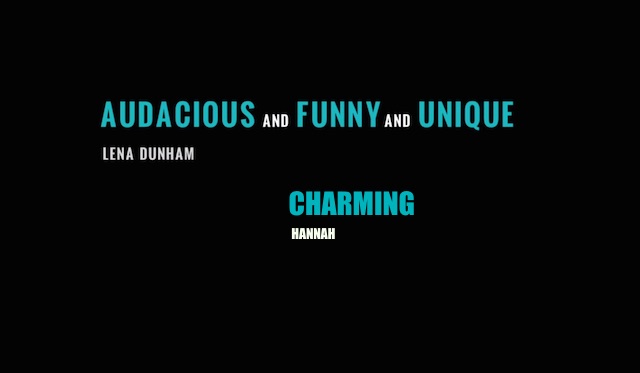
Robin: “It feels true to a queer scene that I would never be a part of, but in an endearing way.”
KaeLyn: “I felt like I was watching a slightly better and queer version of Girls.”
KaeLyn: OK, fantastic. LOL.
What were your favorite parts? What did you react to?
I was really pleased to see a narrative with a bisexual WOC character front and center. I feel like there are so few movies for queer audiences with bi leads. We’re always the sidekick character. Or the “will she or won’t she date the guy/woman” character.
Alley: Yeah I thought Shirin was a very likeable and nuanced character. Much more so than anyone on Girls.
Robin: Yeah I really liked how casually the film treated Shirin’s experiences.
KaeLyn: Yes, and Shirin was just like, “I’m bi. That’s it.” There was no need to discuss her sexuality deeply or for it to evolve or whatever the typical tropes for bi characters are. It was more about her as a three-dimensional person… with all her flaws.
Robin: Oh yeah, I really really liked how a lot of the development isn’t like, Shirin figuring her sexuality or identity out, it’s about her flaws in trying to communicate/connect with/unhook from people. Like that’s what I got from it.
KaeLyn: On what Alley said about her being a nuanced character, I actually found her kind of annoying. Sweet, but annoying. Which is very real. I feel like that about a lot of people IRL. I’m a little older than Shirin and the other characters, so I found some of her plight a little hard to relate to, but I enjoyed it anyway. If that makes sense.
Alley: Yeah she was occasionally annoying but in a way I can relate with so it made her a little less so. Although I am also older…
Other favorite parts were really specific quotes like:
“You’re ruining my birthday.”
“You’re ruining my 20’s.”
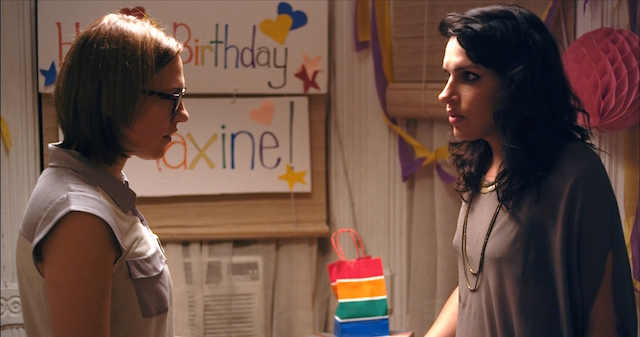
You’re ruining my underwear.
KaeLyn: Haha, Alley. Yes! The writing was so good throughout.
Alley: But this one was my real fav:
CRYSTAL: No, you know, there are people in this world who go on first dates that are perfectly great, and then they wait a while before they engage in sexual contact.
SHIRIN: That’s disgusting.
CRYSTAL: I know. I think it all happens outside of New York.
Robin: What was the line she said when she & Maxine were at her family thing?
“I’m your exotic experience!”
KaeLyn: I saw it in a theatre and I often felt like I was the only one laughing. Like the humor was so dry, but it was so good.
Hannah: Can we talk about the rubber outfit guy? What was that about?
Robin: He had empty eyes.
Alley: He was oddly sweet?
Robin: Ahahaha!
Hannah: Oh, he kind of gave me the creeps.
Robin: Oh, he was kind of sweet and I definitely felt for him. But also, empty eyes.
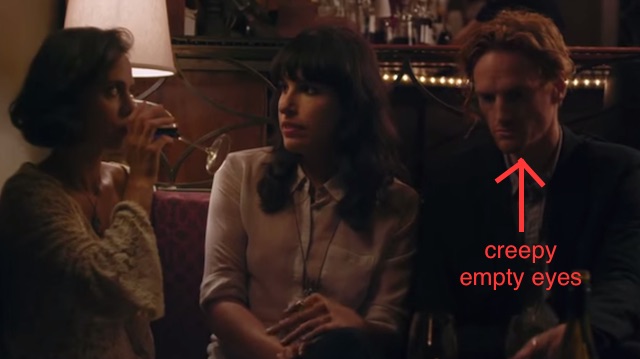
Alley: Ugh, I didn’t have a chance to rewatch and I watched it initially in January so I am having trouble remembering specifically.
Hannah: She was totally an asshole to him though.
Robin: Yeah!
Hannah: In a way I related to.
Alley: But the girlfriend was the mean one, is what I’m remembering.
Hannah: Well he did kick her out after her failed attempt to kiss him. It was sort of mutual assholery all around.
Alley: Worst threesome ever
Well not ever but…
Hannah: Yeah, I was gonna say. I’ve had worse.
Alley: Me too…
Unfortunately
KaeLyn: Hahahaha
I have only had good experiences, I guess
Alley: Like the opposite of Stef’s amazing musical story, which is officially my favorite threesome story ever.
KaeLyn: I loved that scene because they told so much through body language. There was very little talking.
Hannah: Yes!
KaeLyn: But you knew exactly what they were all thinking.
Robin: Yes!
Hannah: I love that.
KaeLyn: And that’s so true to sex IRL. Like, we should talk about what we want and what we’re doing. Oh god, we should do that, but so many people just fumble through it.
Hannah: It just says so much about the actors and the directors and the editors all working so well together.
Alley: Agreed. It was a very well done scene even if it was uncomfortable. I mean that was on purpose and clearly came through.
KaeLyn: It was SO uncomfortable.
Hannah: Ugh when she kisses him on the shoulder!
I wanted to become a puddle
KaeLyn: I thought a lot of Shirin’s narrative was about drifting, feeling surrounded by people, but always alone. And this was such a great example of that.
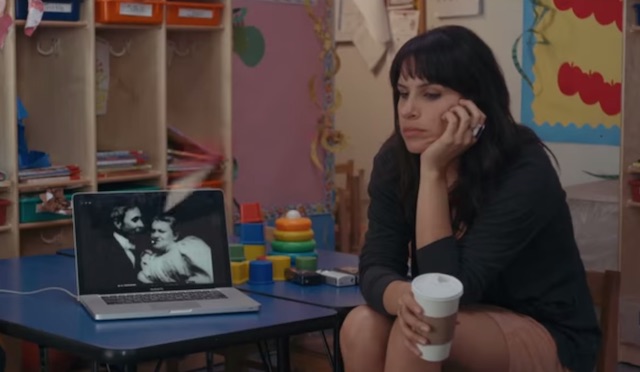
I think I have to poop.
Alley: That’s an interesting point and kind of reflects the timeline.
Hannah: I really like that.
KaeLyn: Like she is just so hungry for connection.
Alley: Which I wasn’t sure I liked because it seemed so opposite of what I expected from the trailer, but hearing your thoughts kind of makes me think it worked.
Hannah: I don’t think it directly relates to the bisexual narrative, but it does reflect a sense of outsiderness.
KaeLyn: And after losing Maxine, she doesn’t know how to plug in but she keeps grasping at it.
Robin: Mmmn, I agree. But also can we talk about Maxine?
KaeLyn: I think it does directly relate to the bisexual narrative.
Hannah: Or I guess that it could stand alone? But also strengthens the bisexual narrative? Sorry my head is full of mucous.
KaeLyn: There are usually those stereotypical narratives about bisexuals we chatted about earlier. So there is no “bisexual path” to follow. So how does a real life bisexual navigate the world? Shirin is mired in a world of “otherness.” She’s got her Persian family and her white ex-girlfriend and being stuck in her mid-20’s somewhere between that lawyer she goes on a date with and the idiots she also tries to date that are beneath her. That’s the whole movie, right? Like where can she fit in?
Hannah: Yeah, we’re agreeing, right KaeLyn?
KaeLyn: Yes, we’re totally agreeing. I’m just writing too much. LOL
Sorry, Robin! Yes, let’s talk about Maxine!
Robin: Y’all, I am gonna be real. Shirin & Maxine’s entire relationship didn’t resonate with me. I can’t tell if that’s the intent.
KaeLyn: I felt the same. Say more. What about it for you?
Robin: The thing that comes most strongly to mind is when they get high together and they say their “I love you’s.” But it felt… unearned? Like a shortcut to an emotional payoff.
KaeLyn: OMG Refresh my memory. I watched it in October and I’m blanking on this scene.
Robin: I think it was a flashback that starts with Shirin waiting at the window while Maxine picks up weed
Alley: Yeah, I think that was one of the scenes that started my “backwards” feeling of the narrative.
Robin: And then they smoke and Shirin’s like, “We’re the same kind of stoned person,” and that becomes a moment.
Hannah: Ahahaha
KaeLyn: YES. I remember now.
Alley: Agreed, it was kind of unearned.
Robin: And I couldn’t tell if it was meant to show how… specious their relationship was? Or I was just being an Old Person and thinking “You’re STONED, do you even KNOW WHAT LOVE IS?!”
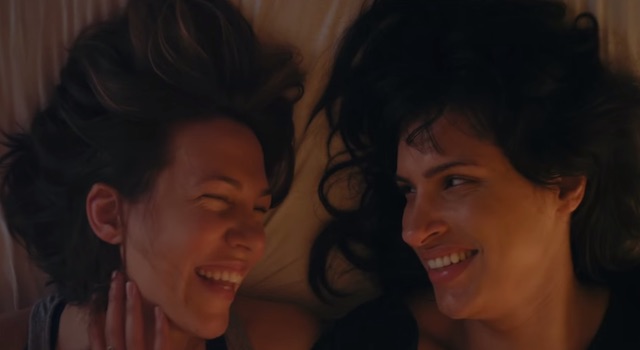
OMG I DON’T KNOW WHAT LOVE IS AND ALSO I REALLY WANT A PIZZA BAGEL.
Hannah: Okay, so maybe this is just because I don’t remember how the scene hit me in the moment, but I feel like it was deliberate. Sort of a commentary on the selective memory we have about our relationships? Like maybe she was even looking back on that moment and thinking, “I was stoned. I don’t even know what love is”?
KaeLyn: That’s an interesting way to think about it, Hannah.
Robin: I dunno, for something that ostensibly kickstarts the narrative of the movie, the relationship felt thin to me.
Alley: Yeah, I can’t say I ever really liked Maxine.
KaeLyn: Here’s a question: did you think the movie was about the relationship with Maxine? I didn’t.
Hannah: No, not at all. Though I did have empathy for Maxine at points.
Alley: Not sure what exactly it was trying to say beyond being funny that they first met/commiserated over hating everything — like hating things is such the cool hipster thing to do…that they hate.
KaeLyn: Yeah, Maxine was just as immature as Shirin. She was more patronizing, though. I felt like Maxine felt Shirin was beneath her intellectually and socially.
Robin: Agree.
Alley: KaeLyn, no, you’re right. It wasn’t just about that relationship for sure. It was about Shirin finding her way in the world. Which she sort of does by the end and sort of doesn’t, which is pretty true to real life. So I appreciated that.
KaeLyn: Yes, I think the audience I was watching it with was expecting a hipster romantic comedy.
Alley: Yeah, it was better than that for sure. Not that a hipster romantic comedy wouldn’t be fun to watch, but it went deeper.
KaeLyn: Can we talk about what we didn’t like or what didn’t work?
Hannah: I don’t think I took many issues with it. Other than the aforementioned thin relationship, it wasn’t trying to be anything more than what it was.
A little slice of life, of a person just trying to live the life they are meant to live. There was no moral, or high drama. It was just pretty and it felt honest to me.
Robin: I do wish there had been more with her family, but like, that gets into the territory of “I’d have done it differently.”
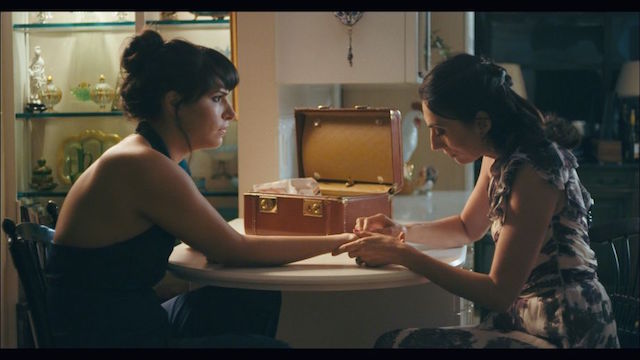
Ugh. Mom, you’re supposed to soak the cuticles first. This is why I never let you do my nails.
KaeLyn: I feel like it took a queer filmmaker, writer, actor to pull off that level of authenticity. It felt fresh to me. But I have to say I don’t love it as much as other people seem to. I enjoyed it very much. Does that make sense?
Hannah: Yeah.
Robin: I think I’m with you, KaeLyn.
KaeLyn: Like some people are over the moon about it and I’m like, “That was a really well written, directed, and acted movie with high production value and it felt really authentic and the narrative thread was strong. And it wasn’t my favorite.” And I can’t put my finger on why I’m not more ecstatic about it.
Alley: Me too KaeLyn.
KaeLyn: I can’t even say what I wish was different.
Alley: Like, I can’t pinpoint what could have been better but, like, the trailer was SOOOO good I was a tad disappointed.
KaeLyn: I guess that the one way it is cliche is it’s another story about a queer person with lots of class privilege interacting almost exclusively with other people with high levels of social and economic status. And maybe that made me feel less snuggly about it.
Alley: The class aspect is a good point.
KaeLyn: It’s what I don’t like about Girls. SO “white feminist” framework.
Alley: I was about to say that but didn’t want to keep bringing that up :wink:
KaeLyn: Haha.
Alley: That show just reminds me of all the women I went to college with that I loathed.
KaeLyn: Yeah, I think that’s what kept me at an emotional distance from Appropriate Behavior. Everyone was so privileged and really only had that worldview. And I kind of wanted them all to get over themselves.
Alley: It’s that balance of the film making fun of their own privilege but also getting a little mired in it. Tough balance.
KaeLyn: But lawd, there are hundreds of similar movies and books and musicals about “finding yourself” that feature young white men.
Alley: Totally.
KaeLyn: And even if there are problems with that “journey to the self” trope, I’m just so grateful there was a bisexual Persian woman at the center of it this time.
Alley: “Appropriate Behavior: Way less annoying than Igby Goes Down.”
KaeLyn: HAHAHAHA
Robin: HAAAAA
Hannah: Hehehe
KaeLyn: OK, so wrap up question: Would you recommend it?
And why?
Hannah: Yeah sure.
Robin: I would!
Alley: Absolutely, even if there are some formulaic portions even taking a “quintessential” or supposedly “universal” story and giving it to a bisexual woman of color is worth it and there are some damn funny lines.
KaeLyn: On a scale of 1 (the worst) to 10 (the best), I’m giving it a 10 as a film and a 7.75 on a personal level.
Robin: Yeah, like I wouldn’t be mad if my queer ladies film club wanted to watch it again.
Alley: I fully expect, also, that Desiree Akhavan’s next film will be even better.
KaeLyn: I would watch again.
Alley: I loved The Slope.
KaeLyn: I can’t wait to see what she comes out with next. Appropriate Behavior is definitely putting her on the map.
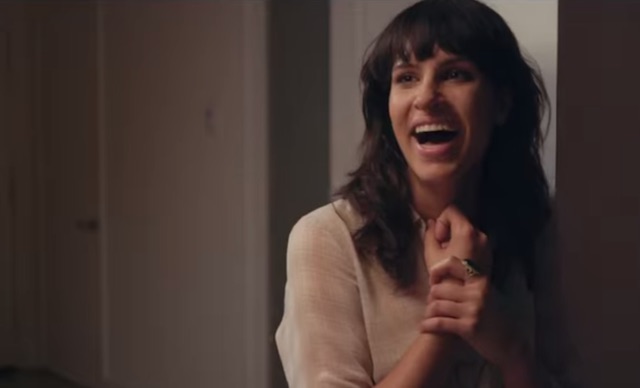
I am literally winning at everything.
Hannah: Also you guys know that Desiree Akhavan was actually on Girls for real, right?
I meant to say that earlier, when you were complaining about Girls.
KaeLyn: Yeah recently right? But I haven’t seen those episodes. I mean, I’ve only seen a few.
Hannah: Yeah it’s brief. She plays pretty much the same person.
KaeLyn: She plays a writer?
Hannah: Yes, she does.
KaeLyn: I have no idea because I don’t watch Girls. Except that one time when I gave it the ol’ three-episode try and it failed.
Hannah: Yeah, I only saw the first couple episodes this season. I could go on about why Marnie is the entire reason the show is terrible but I’d be talking to a wall.
KaeLyn: Haha. Any final thoughts on Appropriate Behavior?
Alley: I would probably give it a similar rating, KaeLyn, but to keep it simple I’ll just give it an 8.
KaeLyn: Hahaha
Robin: I would give it a 7. No, amend: 8.
Robin: Just remember the “I’m your exotic experience” line which is the REALEST MOST AWKWARD THING. I cannot find the exact wording but it really stuck with me.
KaeLyn: That was the best! Ok, I’m bumping it up to an 8.
Alley: Hahaha, I like how we are all groupthink convincing each other to up the rating by 1.
KaeLyn: When I mini-reviewed it on Autostraddle in my film fest recap in October, I gave it this: “Rating: Ten sammies from that new Vegan Pork-Dumpling Grilled Cheese food truck with the hot server.” I stand by that. No, I amend it to include the kinky coffee shop that Robin is at.
Robin: Oh, KaeLyn, here’s the link: Wicked Grounds Kink Cafe & Boutique
Alley: I was just in SF working from coffeeshops. Wish I would have gone there!
KaeLyn: It is so cute and unassuming from the outside. Well, if you don’t know what the leather flag looks like… Ooh, they have pizza bagels!!!
Robin: It’s really like your average coffeeshop until you start looking at the art on the walls.
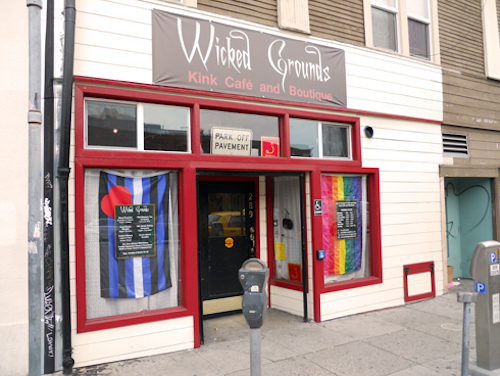
They have pizza bagels!
KaeLyn: Oh, so no one is doing kinky things around you IRL? I really feel like would be the best.
Robin: Eh, not yet. And the lil knickknacks for sale. It’s only 3 PM here.
KaeLyn: OK, fine. That’s acceptable. I’m assuming you can only play, right? You can’t actually fuck? That seems unsanitary.
Robin: I mean the bathroom is spacious and there’s only one key…
Alley: Hahahaha
KaeLyn: Ooooh
Robin: Attached to a heavy chain.
KaeLyn: Well that’s fine. I just don’t want lube too close to my coffee.
Alley: Would that be like a Bulletproof Coffee spinoff?
Robin: Yesssss
KaeLyn: Alley!!!
Robin: Oh my god. What would the spinoff be called?
KaeLyn: Frictionproof Coffee? Bullet Coffee and it is served with a bullet vibrator?
I dunno. We need Lizz or Ali on this…
What do ya’ll think? Will you be seeing it? Have you already seen it? How would you rate it and what are your smart and insightful thoughts?
Get to your nearest kink cafe and tell us everything.
9 Pretty Delightful Lesbian & Queer Comedies You Can Watch Online
It takes a lot of skill and talent to make a funny movie actually funny and it takes a lot of skill and talent to make a lesbian movie actually good. But often, those two situations converge. I’m here today to speak to you about the movies that have been birthed from that convergence and stepped into the glorious light of online streaming.
9. D.E.B.S. (2005)
“When the leader of an elite team of paramilitary college co-ed superspies takes on the world’s greatest supervillainess, it’s love at first gun sight in this smart and sexy “sleeping with the enemy” comedy adventure.”
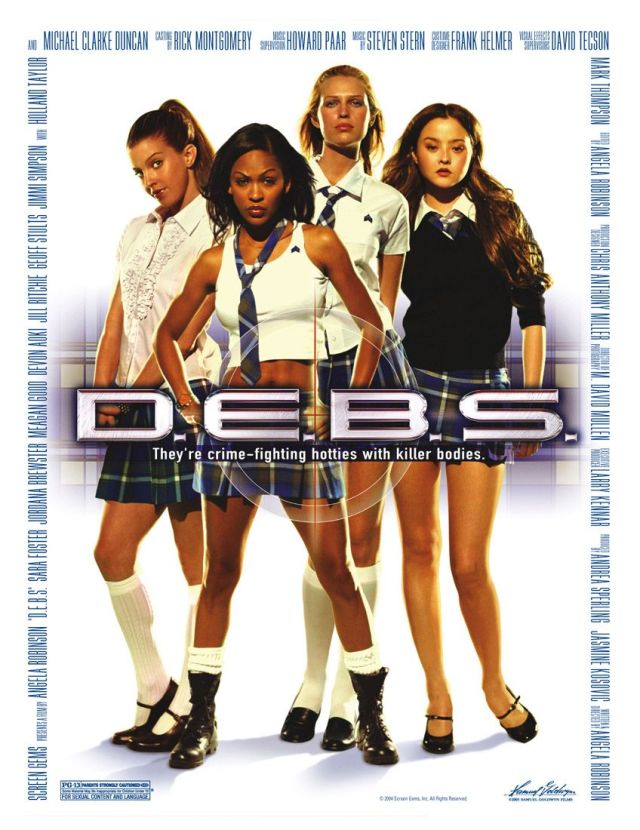
The premise is delightfully campy, providing a queer twist on the satirical faux-spy-thriller with Angela Robinson’s snappy writing at the helm. It won’t change your life, but it’ll make for a nice evening of entertainment with sexy turns from Jordana Brewster and Devyn Akoi, among others.
8. Codependent Lesbian Space Alien Seeks Same (2012)
Also available on Netflix.
“A low-fi sci-fi quirky comedy following the adventures of three lesbian space aliens on the planet Earth, sent here to look for love in order to save their planet.”
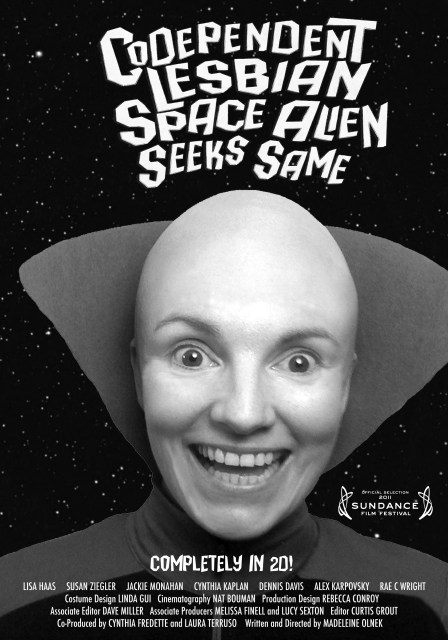
It’s super weird and super super smart. Even after it’s over, you’re not sure what you watched, but you’re glad you watched it.
7. The Four-Faced Liar (2010)
Also available on Wolfe Video and Netflix.
“A story of love and lies for four twenty-somethings looking to find themselves in New York City.”

Okay so I personally wasn’t really in to this movie, but y’all seem to really like it! For example, Kate has seen it SIXTEEN TIMES! She describes it like so: “At first I didn’t actually know there were lesbians in the plot. You can imagine my glee when lo and behold the main character Bridget is a womanizing lady who lives in a shitty apartment with her best guy friend, and falls for the new straight girl, Molly, who has already shacked up with the man she imagines she’ll marry. Complications ensue, and the complications are familiar to anyone who has ever been a twenty-something who thinks they can chainsmoke their emotions away.”
6. Who’s Afraid Of Vagina Wolf? (2014)
“A fun new lesbian feature about looking for love at age forty!”
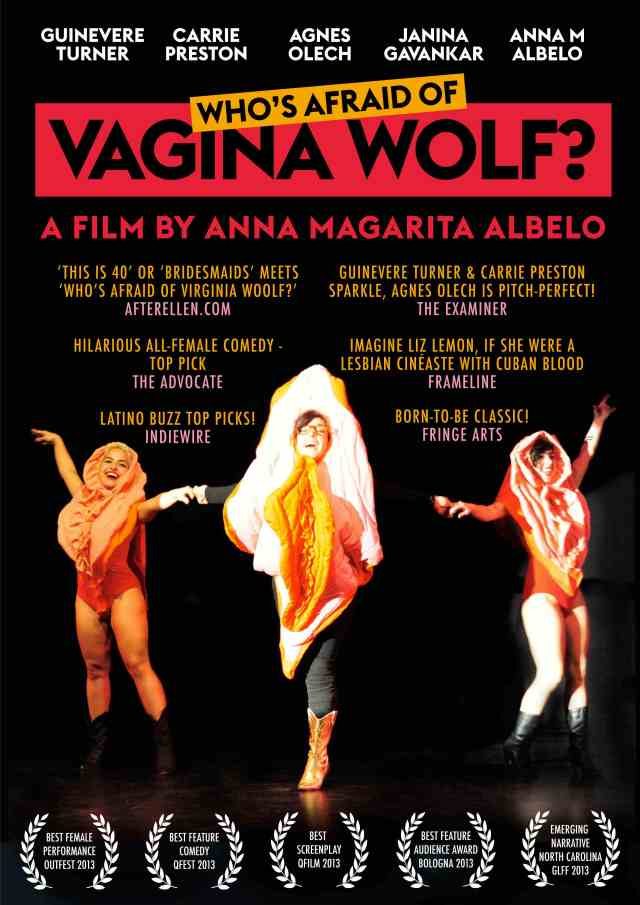
I still haven’t seen this one but have heard nothing but good things and it looks really delightful. And yes, this is the second time I’ve recommended it without having seen it but I’m just being real with you.
5. Life Partners (2014)
“Sasha (Leighton Meester) and Paige (Gillian Jacobs) use their co dependent friendship to not venture into the dating world. When Paige meets Tim (Adam Brody) and get serious their friendship changes. Sasha tries to keep their relationship the same.”
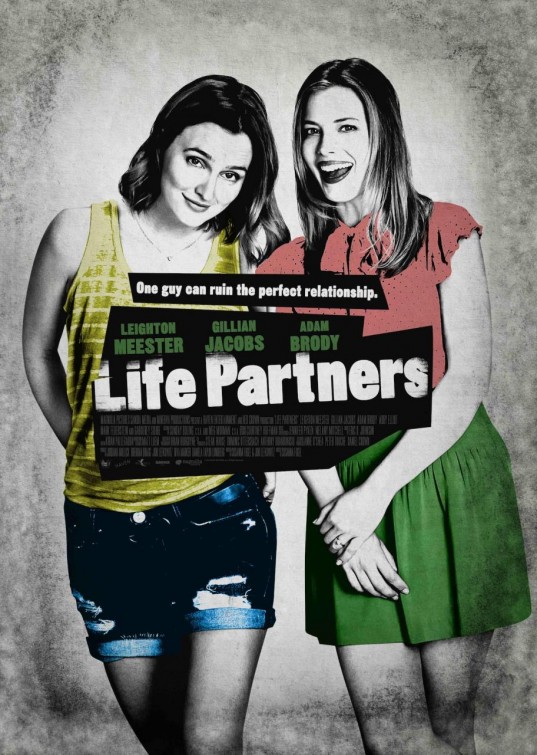
This new release has gotten positive reviews from pretty much everybody I’ve talked to about it, including me. However, I wished there’d been a more prominent romance story for the lesbian character.
4. Imagine Me & You (2006)
“Right before she’s to say “I do,” a bride-to-be finds herself attracted to the female florist her mother hired to do the arrangements.”
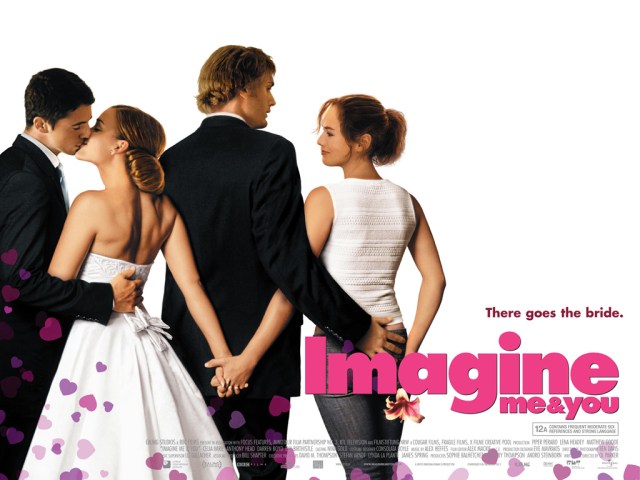
This is Heather Hogan’s favorite lesbian movie. It follows all the familiar mainstream romantic comedy tropes and has the sheen of a wide-release film… but with girls!
3. But I’m a Cheerleader (2000)
“A naive teenager is sent to rehab camp when her straitlaced parents and friends suspect her of being a lesbian.”
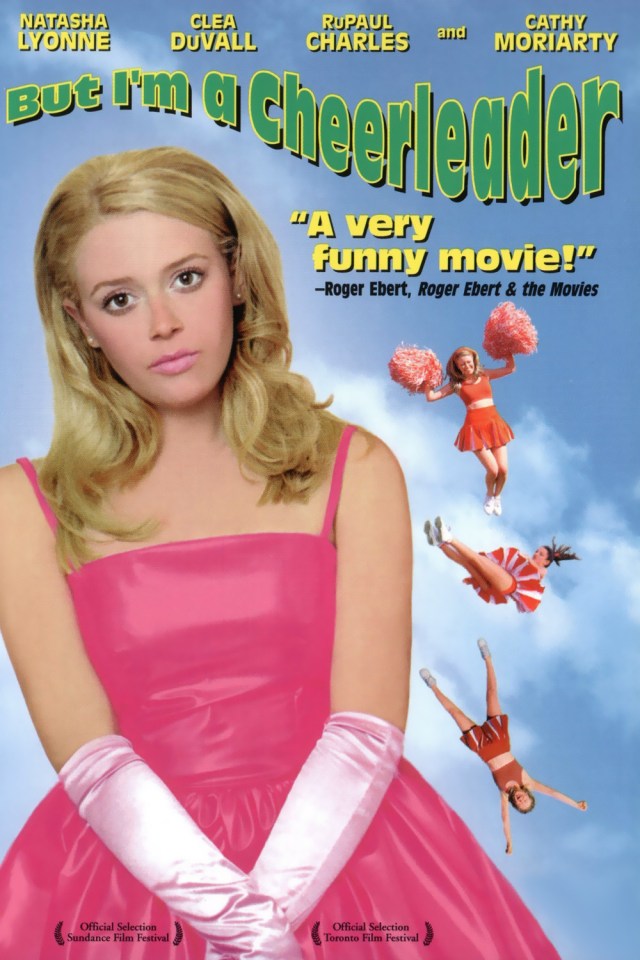
If you haven’t already seen this movie, then you are missing out on a monumentally important life experience. It’s hilarious, it’s smart, it involves Clea Duvall, what else can a grrrl ask for?
2. Saving Face (2005)
“When a young woman’s pregnant, unmarried mother moves into her apartment, she does what any dutiful child with an expectant widow on her hands would do: she sets her up with every bachelor in town.”
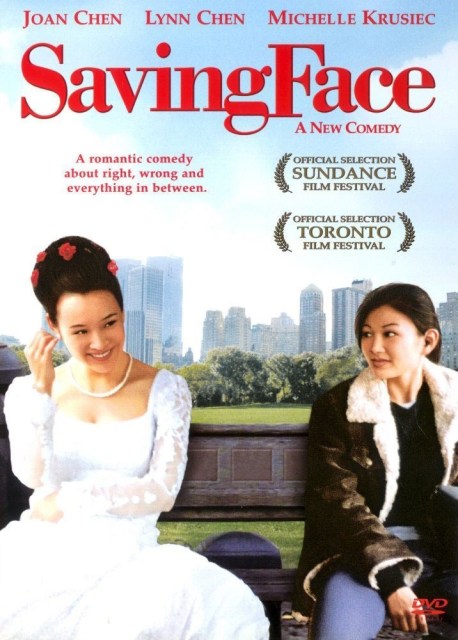
This film doesn’t get enough credit, so we try to give it as much credit as we possibly can, whenever we possibly can. It’s a sweet love story between two Chinese-American girls — a tomboyish doctor whose 48-year-old mother has just moved in with her following an affair and the sophisticated ballet dancer who teaches her to fall… IN LOVE!
1. Appropriate Behavior (2014)
“Shirin is struggling to become an ideal Persian daughter, politically correct bisexual and hip young Brooklynite but fails miserably in her attempt at all identities. Being without a cliché to hold onto can be a lonely experience.”
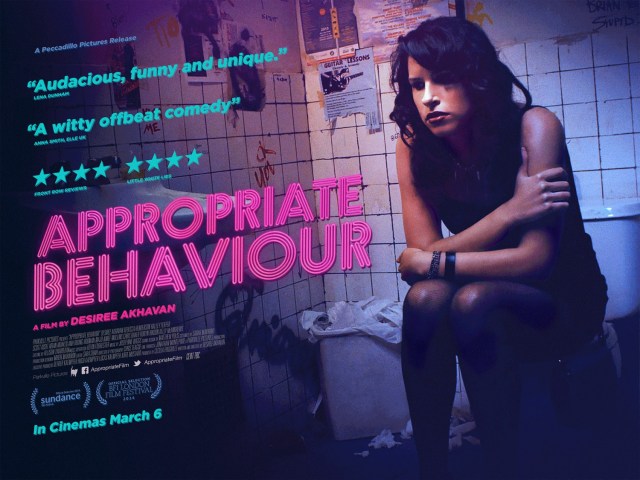
Real talk: this post mostly exists for me to tell you to watch this movie. It stars and was written by bisexual actress Desiree Akhavan, who plays her own version of the Brutally Honest Misanthropic Anti-Pixie Daydream Girl, vacillating from hyperbolic-but-relatable despair to Ilana Wexler-esque repellant charm. It’s quirky, funny, and delightfully indie, chock-full of inside queer jokes that’ll surprise you and tickle your ripbones.
1 Queer Girl + 10-Day LGBTQ Film Festival + 20 Tons of Popcorn = These Movies You Need To Watch
For 10 days every year, I clear my evening and weekend schedule for the ImageOut: the Rochester LGBTQ Film Festival. ImageOut is the largest film festival in Rochester, NY and the biggest LGBTQ film festival in New York State. This year there were 39 programs and 65 films, which believe-it-or-not is actually fewer programs than in years past. My spouse and I have been festival-goers since we moved to Rochester in 2007 and have been members since 2008. For a medium-size city like Rochester, ImageOut is a major queer event. There is nothing else like it except maybe Rochester Pride. Thousands of LGBTQ folks and allies come out and gorge themselves on buttered popcorn and independent film. The fest is held at small, local movie theaters. The home base is the Little Theatre, the last standing theater of the “little cinema movement, a network of small independent movie theaters created in response to the mass merchandising of the entertainment industry in the 1920’s.”
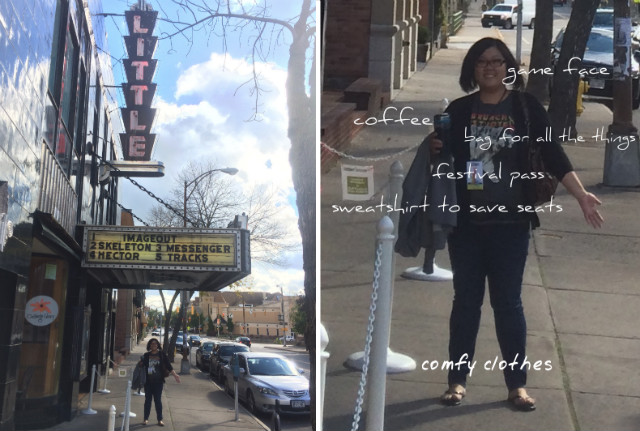
First Saturday of the fest and ready for a 5-movie run.
The festival is a commitment in time and dollars, but it is worth it. We get to see the best LGBTQ documentaries, romcoms, and comedies before their theatrical release and many short films and experimental indie films that never get a theatrical release.

Popcorn with cajun seasoning for dinner seems like a great idea for the first 6 days in a row.
So here I am. I survived another fest. I saw 27 programs and 38 films. Popcorn disgusts me. I don’t plan to walk into a movie theater again until Hunger Games weekend. I am in an extended food coma from 10 days of eating nothing but fast food and concession stand snacks. But I’m here. To give you the scoop on the best upcoming and current LGBTQ films, many of which will probably show up on Netflix or become available at Wolfe in the nearish future. I’m covering only the films about, by, or relevant to queer ladies, broken up by genre, and in order of best to slightly less best.
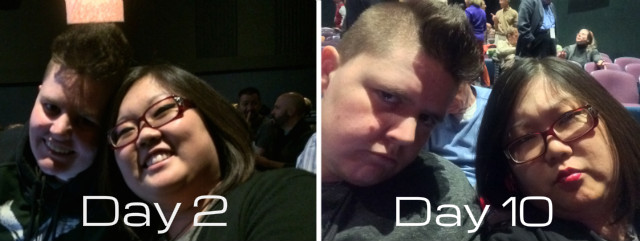
27 programs in 10 days is kind of a lot. We need a nap.
Overall themes in 2014: bisexuality is real, beware obsessive creepy lez friendships, trans narratives that are not transition stories are finally a thing, and we are all really mortal and life is short, people.
Romantic Comedy a.k.a. BOW CHICKA WOW WOW
http://vimeo.com/95299762
Boy Meets Girl
This is easily my favorite film in this genre and one of my favorites in the fest — sexy, funny, affirming, poignant. Ricky Jones (Michelle Hendley, real-life video blogger), is a twenty-something fashion blogger and wannabe fashion designer in Kentucky. She’s sharp-tongued, really hot, and flirting with the idea of romancing a girl for the first time. She’s transgender and, while there are scenes where this is discussed, it is really not a big deal or the crux of the story. She is out to everyone in her rural town and gets unconditional love and support from her dad and little brother and her childhood best friend, Robby (Michael Welch). The meat/tofu/protein of the story is Ricky’s love interest, Francesca (Alexandra Turshen), a rich girl from town who has recently returned from boarding school. Francesca (who is engaged to a Marine with his own issues) and Ricky, who have both otherwise only dated boys, become friends and…well, eventually something more. I won’t give away the ending, but what I loved most about this movie is that the story is about Ricky finding her path in love and life on her own terms. There’s a real affirmation that bisexuality and sexual fluidity is valid, that gender identity has 0% to do with body parts, and that living your life on your own terms is 100% OK. (P.S. Don’t judge this movie by its very brief trailer. IT IS SO GOOD. REALLY. GO.)
Rating: One billion high fives from Beyonce
BFFs
The crowd loved BFFs, the Opening Night film of ImageOut and the New York State Premier of the film. It was a laugh riot and we even got to do an Google Hangout audience Q&A with the stars, Andrea Grano and Tara Karsian. It has been reviewed here on AS before, so I will leave you in the capable and lovely hands of Brittani. It was everything Brittani promised it would be: hilarious, fun, complex characters, female-driven comedy.
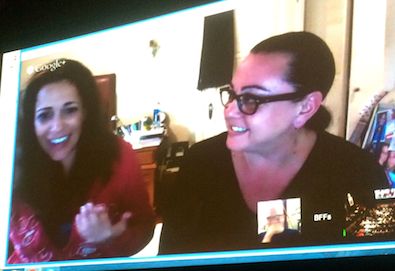
Talkback with Tara Karsian and Andrea Gano, real-life BFFs but not real-life lovers.
Rating: Bottomless refills on your mimosa at brunch
Tru Love
I’m gonna’ be honest with you. I didn’t love it. But lots of folks did, including my spousal unit. So, if you like shamelessly corny romance movies — and it’s OK if you do — you will probably love this movie. The movie is about Tru (Shauna MacDonald, who also co-wrote and co-directed), a love’em and leave’em lez type who bounces from girl to girl like she’s channeling Shane McCutcheon. The movie opens with Tru in bed with a naked woman, whose name she guesses incorrectly during morning pillow talk. Oops. Also like Shane M, Tru finds herself falling for an older woman, her ex’s mother, Alice (Kate Trotter). Alice is visiting her daughter, Suzanne (Christine Horne), a high-powered attorney with no time for mother-daughter bonding. As a favor to Suzanne, Tru helps greet and entertain Alice while Suzanne is busy working and things take a turn towards the sexy from there. This could be just another lez romance flick, but the actors really bring it. Trotter makes Alice a fully dimensional character — not a lonely widow so much as a radiant and self-assured woman who was held back by a husband who just didn’t get her. The relationship between Tru and Alice is believable and it was nice to see a sexy movie about a younger woman and an older woman that is affirming and where both partners meet on equal footing a.k.a. not a Loving Anabelle situation.
Rating: One open-mouthed kiss on a second date, but no tongue
Happy End?!
This is a quirky romance drama and I did not hate it. As someone who is kinda’ meh on the romance category, I didn’t connect with the characters in the way I wanted to. There was a lot of suspension of disbelief in this movie that is one part light-hearted crime drama and one part romance-I-kissed-a-girl sexual exploration. That said, it is definitely worth watching. I thought the bar where one of the main characters, Valerie (Verena Wüstkamp), sings at was kind of L Word-ish. The premise of the film is that Lucca (Sinha Gierke), a girl about the graduate high school and head off to a prestigious law school, get in a little trouble with the law. As a result, she has to do community service and ends up volunteering as a hospice facility, where she meets Valerie. Valerie, who has her own complex past, has developed a very close friendship with one of the residents, Herma. When Herma passes, Valerie finds herself fighting with Herma’s buttface of a son. Soon, Lucca and Valeria are off on a road trip adventure to liberate Herma’s ashes and…you know…explore some other adventures. The ending surprised me and I’m not about to give it away. You’ll have to watch for yourself.
Rating: Two fingers — no more and no less
Documentary a.k.a. BRRRIIIIIING! SCHOOL IS IN SESSION
Out in the Night
We were lucky to have three of the New Jersey Four at the screening for a Q&A. As they walked up to the stage, the crowd gave them a standing ovation, still wiping away tears of outrage. Out in the Night tells the story of four black queer women who were prosecuted for defending themselves against a man who threatened and attacked them on the streets of New York City. The mainstream media ran headlines about the “lesbian wolf pack” and “gang of killer lesbians” on a violent rampage. The jury never saw key evidence that was later revealed through the documentary. Renata Hill, Patreece Johnson, Terrain Dandridge, and Venice Brown were convicted by an all-white jury of committing second-degree gang assault, with prison sentences ranging from 3.5 to 11 years. By following the NJ4 and their families, children, and friends, we get a clear picture of the gross inadequacies and institutionalized abuse of the prison industrial complex. The message to queer women of color is clear — you are not safe anywhere and you do not have the right to protect yourself from violence. This is a must-see documentary for every person who cares about justice and especially for those who don’t have much of an opinion about the criminal justice system. Criminal justice is a queer issue.
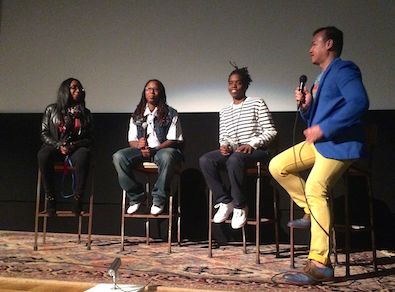
Talkback with Patreece Johnson, Renata Hill, and Terrain Dandridge with moderator and ImageOut programmer, Michael Gamilla.
Rating: $100,000,000 in donations to FIERCE in the NJ4’s name
Kuma Hina (Teacher Hina)
“Kumu” means teacher. Hina Wong-Kalu is a kumu, teaching traditional dance at a Hawaiian charter school that promotes Hawaiian history and culture. Wong-Kalu also identifies as mahu, a third gender person with traditional roles in Tongan culture. Kuma Hina showcases traditional Hawaiian dance and music; Wong-Kalu’s new marriage to Hema, a young Tongan man from Fiji; Wong-Kalu’s teacher and mentor relationship with Ho’Onani Kama, a young girl who may identify as mahu and longs to dance with the boys; and Wong-Kalu’s work in local government as a cultural council member. Kuma Hina is as much about Hina Wong-Kalu as it is about navigating the world between traditional and contemporary culture, masculinity and femininity, and what it means to fully embrace your gifts. All the documentaries I saw were strong, but this was one of my favorites.
Rating: A symphony of flowers budding all at once
Born to Fly: Elizabeth Streb v. Gravity
I fully admit that I didn’t know about lesbian choreographer and “pop action” innovator, Elizabeth Streb. This is ridiculously shameful because she is a former Rochestarian. I had the great honor of meeting her before the screening of the documentary about her work and influence on experimental choreography. Her work transcends boundaries of race, class, experience. Just watching film footage of her ensemble’s performances had my heart pounding. And that is exactly the point. This documentary will take you to new heights, literally, and is yet another documentary in the LGBTQ genre that is really about the art and the person…who just happens to be queer. I’m all for that. Also, I found out that Streb’s studio, the STREB LAb has free, open rehearsals during the day. So if you are in or near Brooklyn, check that out. I plan to stop by the next time I’m in NYC. Check out this film if you want to see beautiful bodies doing gravity-defying beautiful things that will actually make you stop breathing for a second. As Streb says, “You have to get beyond the barrier of self-protection before you can really fly.”
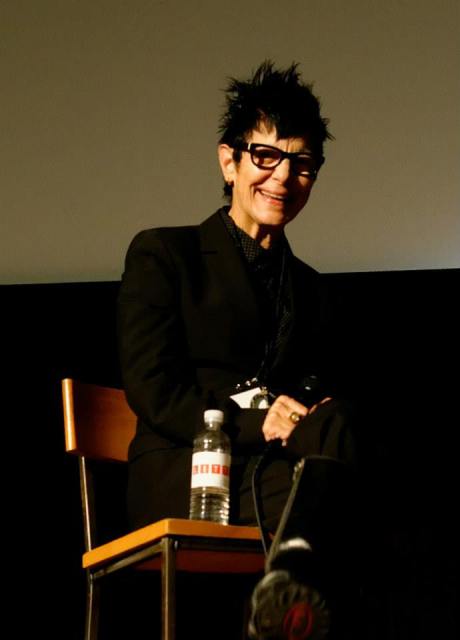
This human is a true badass. via ImageOut
Rating: A simulated but very realistic plunge to your death
Comedy a.k.a. HAR HAR HAR
Life Partners
Ya’ll saw the trailer for this film and freaked out. I saw the movie and freaked out. WATCH THIS MOVIE. WATCH IT IMMEDIATELY. It is so funny. This is like, the much lighter and more enjoyable version of Appropriate Behavior (see below). Sasha (Leighton Meester, Gossip Girl) is a lesbian and her best friend, Paige (Gillian Jacobs, Community, Walk of Shame), is straight. Don’t worry. No one questions their sexuality or whatever. Not in this movie. Sasha and Paige are who they are, which is bestest buddies who are really codependent and in a loving long-term friend relationship that has usurped every romantic relationship they’ve ever attempted. They love America’s Next Top Model and they love each other. So when Paige meets a man, Tim (Adam Brody), and starts to settle down with him, her friendship with Sasha is put to the test. Watch for cameos from Gabourey Sidibe, Mark Feuerstein, and Kate McKinnon. The dialogue and comedy writing is spot-on. You will love them and kind of dislike them a little and maybe even see yourself in them a little if you’ve reached that point in your life where half your friends are still living at home and the other half are getting hitched.
Rating: A sleepover with your best friend where you eat cake mix batter and watch trash TV
Appropriate Behavior
This is basically HBO’s Girls for queer ladies. I mean, it literally kind of is because it was written by, directed by, and stars Desiree Akhavan, the so-called queer Lena Dunham, who recently landed a role on Season Four of Girls. The writing is strong. The film is beautifully shot and edgy in all the right places. I have to say that if you find Girls insufferable, you may find Appropriate Behavior insufferable. The timing and writing and the isn’t-life-so-hard-and-stuff-why-me-WAH plotline is very similar. I enjoyed the movie, though. It is a worth seeing, especially if you have a dry sense of humor. Shirin is a bisexual hipster chick from Brooklyn who is just trying to find her way, be a good daughter to her traditional Persian parents, be the “right kind” of bi, and find a job that doesn’t suck. She spends the film obsessing over her ex, Maxine, who cut up all her panties and kicked her out of their apartment when they recently broke up. Akhaven is a brilliant writer and actor. Shirin is a character that you all know, the one who is stuck and can’t seem to find a way out. There’s a little speck of hope at the end of the tunnel, though, for all the characters. I appreciated that Akhaven didn’t wrap everything up with a neat bow, letting the audience imagine any number of futures and focusing the attention on the character development instead of simple resolution. Bonus points for a bisexual main character in a feature film.
Rating: Ten sammies from that new Vegan Pork-Dumpling Grilled Cheese food truck with the hot server
Cupcakes (Bananot)
This musical comedy falls into the category of kinda lesbian because there are lots of women and a couple queer women. The film is about a group of friends who gather together to watch UniverSong, a show similar to Eurovision. The main characters are Ofer, an elementary school teacher who performs drag for his students; Keren, an introverted blogger with glasses; Dana, an overworked and underappreciated aide to a cabinet minister; Anat, a bakery shop owner; Yael, a dissatisfied corporate lawyer with a beauty pageant past; and Efrat, your token (hot) lesbian singer-songwriter. They gather in Ofer’s apartment for a UniverSong viewing party, during which Anat reveals that her husband is leaving her. To cheer her up, they sing her an improvised song. Ofer records the song on his phone and later decides, just for fun, to enter it into UniverSong. Suddenly, they are representing Israel at UniverSong and are thrust into a frenzy of producers, choreographers, stylists, and the question of whether they should put their real lives on hold to enjoy the moment. This is an infectiously silly and campy and charming with a big dose of heart. The refrain from “Song for Anat”may get stuck in your head for days. I’m just warning you.
Rating: 100 rainbow jazz hands and a sparkly gown
Drama a.k.a. DUN DUN DUN
52 Tuesdays
One of the most creative and fresh films this year was 52 Tuesdays, a film about a teenage girl, Billie (Tilda Cobham-Hervey), and her journey in grappling with the news that one of her parents is transitioning to live full-time as James (Del Herbet-Jane). Part of the transition process is asking Billie to move out of the house for a while, one year or 52 weeks, to be exact. Billie and James agree to meet every Tuesday, a drastic change from living together for most of Billie’s life and from their former relationship as mother/daughter. The story is told from Billie’s point of view as she struggles with supporting James through the transition, moving past feelings of abandonment, navigating their new lives, and coming into her own skin by pushing boundaries with her own sexuality. This film depicts graphic sexuality between teens, which feels very honest while also making some uncomfortable. The film is not perfect. It is, in many ways, the typical transition story. Like the Amazon Prime show Transparent, the transitioning character’s story is told mainly through the eyes of his child, focusing on what the transition means for Billie more than for James. However, there is something different about this story — the juxtaposition of Billie’s own transition into a sexual (and somewhat bisexual) being with James’ transition is poignant and painful and deeply personal. I also appreciate that James is played by self-identified genderqueer actor, Del Herbet-Jane, a continuation of the theme of trans actors playing trans characters in this year’s festival line-up.
Rating: That box of stuff from high school that you just can’t throw out
Violette
Violette Leduc (Emmanuelle Devos) was a feminist writer known for her sexually explicit and painfully honest confessional writing in 20th century London. This historical narrative chronicles Leduc’s life and work, starting with her faux marriage to gay author, Maurice Sachs, to survive World War II. The film turns on the friendship between Leduc and Simone de Beauvoir (Sandrine Kiberlain), her mentor and idol and patron and unrequited love interest. Leduc is crushed when de Beauvoir does not accept her advances, though de Beauvoir comes to regard Leduc as a close friend. Devos and Kiberlain are perfect together, with a strangely sensual and desperate chemistry. Devos plays Leduc, a highly unsympathetic character, with such honesty that you can’t help but like her, even in her worst moments. If Appropriate Behavior is Girls for queer women, Violette is Girls for queer women in post-war France. Also, the sets and the COSTUMES. Oh, my. Everyone and everything is so gorgeous.
Rating: 10,000 hot, flaky croissants and a flask of red wine
Open Up to Me (Kerron sinulle kaiken)
Leea Klemola plays Meerit, a transgender woman who is both completely secure in her self and very lonely. The film opens on Meerit’s last day of therapy, during which her therapist tells her she should put herself out there more and take an active role in finding the relationships she desires. Meerit is estranged from her daughter and wife, working for a cleaning company after she was fired from her social work job. She is doing alright day-to-day, but she misses her old life and her daughter, Pinja. While she is cleaning a therapist’s office, in walks Sami, a married man who mistakes Meerit for a therapist. After coming out to Sami, both about not being a therapist and about being a transgender woman, Meerit begins an affair with him. On top of this, rumours about Meerit are flying around the grade school where she used to work and Pinja is getting caught up in the drama. Suddenly, Meerit is navigating a labyrinth of complex human relationships, trying to find a path back to herself in her new life. Once again, what made this movie work for me is that it is another transgender narrative that has very little to do with the trans character’s transition. Meerit is very happy with who she is and is decidedly open and unapologetic about her identity. The role could just as readily have been anyone struggling with divorce, relationships, loneliness, and the desire for connection. Of course, it would be even better if Meerit was cast with a trans actor, but I’m going to give this film a few gold stars. For a beautiful narrative and for Klemola, who plays Meerit in such a way that you can empathize with her vulnerability without making her a victim.
Rating: 24 hours of uninterrupted meditation
Horror/Thriller a.k.a. AHHHHHHHHH! REAL LESBIANS!
In Hiding (W ukryciu)
HOLY SHIT YA’LL!!! This movie was the greatest. Yes, it’s a Holocaust drama. But, more than anything else, it’s an intense psychothriller about lust, obsession, desperation, and deceit. In 1944 Nazi-occupied Poland, Janka (Magdalena Boczarska) has just come back from a trip to the home she shares with her father, a local photographer. She learns that her father is hiding Ester (Julia Pogrebinska), the daughter of his Jewish neighbor, in a tiny room underneath their parlor floor. Skeptical at first, Janka eventually agrees to help hide Ester. When Janka’s father is captured by the Nazi’s, Janka becomes the sole caretaker for Ester. With no one but each other, Janka and Ester become friends. As the stakes raise, fear and isolation drawing them closer, and a dark secret binding them together, their care for each other turns to erotic exploration. After the war ends, Janka is desperate to keep her lover close, even as Ester falls into deep depression. Janka goes to extreme lengths as her innocent friendship and love grows into a violent and dangerous obsession. This film gets my highest marks. It is beautifully shot. The sex scenes between Janka and Ester are some of the hottest I’ve seen in a while and, quite frankly, this film is a masterpiece of psychosexual horror.
Rating: It puts the lotion on it’s skin…
Crazy Bitches
I really wanted to like this one, but I just didn’t love it as much as I wanted to. That said, a horror flick is an oddity at an LGBTQ film fest and it is worth mentioning that this film exists. The film is set off by an excellent cast including celesbian, Guuinever Turner and Cathy DeBuono (And Then Came Lola). The film is pretty typical for a horror movie. Seven former college friends and one stereotypical gay guy head off for a birthday celebration at a remote cabin in the woods. Before they have time to properly kiki, the body count begins. This is a campy, fun film. Honestly, I could have done with fewer rape references and I was not loving the big reveal, and the lesbian sexiness was scarce. There was only one lesbian character and she mostly was just kind of rapey with one other girl and almost earned a toaster oven with another straight girl who wanted to “keep it a secret.” All said and done, this over-the-top film would be good for a cheesy movie night with a big communal bowl of popcorn. I won’t judge you if you love it. Maybe I’m just a big feminist killjoy who can’t enjoy fun things. You decide.
Rating: 100 manic love notes to Guinevere Turner
Short Films
I’m not going to review/recap all of these because that is just too much. I have given you so many words and videos already! Just check them out for yourself at a fest near you or when/if they come out online! These are in no particular order or rank. I’ve included brief descriptions from the ImageOut program:
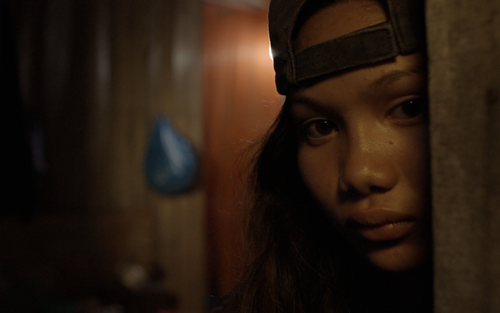
Jellyfish
Danica, a fourteen-year-old fisherwoman and breadwinner for her family, tastes first love with Riya – an alluring transgender woman who arrives in the village one day.
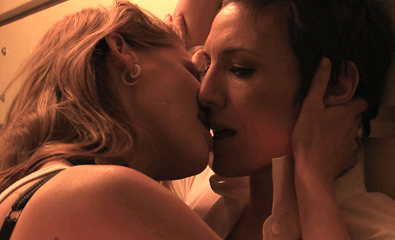
What’s Your Sign?
The language of love (or lust) is universal.
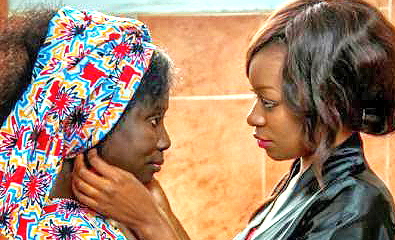
The Other Woman (L’autre femme)
In Senegal, polygamy is legal, so a man can be married to more than one woman. But The Other Woman reveals the unexpected risks of bringing home a second wife.
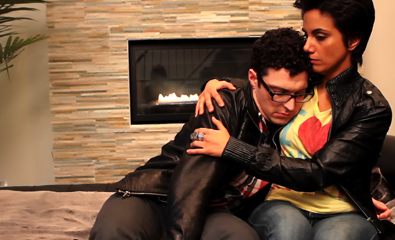
One Night Stand
The morning after hooking up takes a hilarious turn for two women.
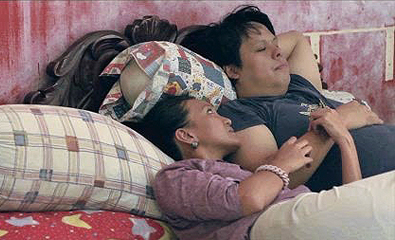
Wandering Butterflies (Mga Ligaw Na Paru-paro)
Miriam unexpectedly faces the prospect of spending the night alone on her birthday after a rift with her jealous husband, caused by a flirty text message of someone named Alex.
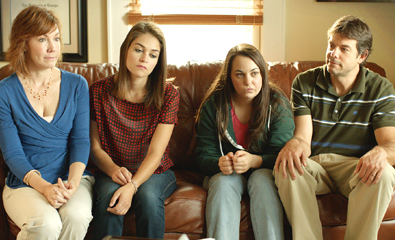
Alone with People
Growing up gay in the South, a high-school girl seeks the help of a therapist to accept who she is and share that with her family and friends in this funny yet poignant coming-of-age and coming-out story.
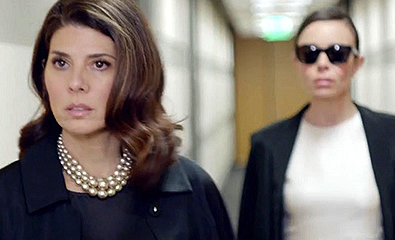
She Said, She Said
Oscar-winning actress Marisa Tomei and Elodie Bouchez play a lesbian couple on the brink of a nasty divorce and trying to split their properties through mediation. Parks and Recreation’s Aubrey Plaza also does a hilarious cameo.
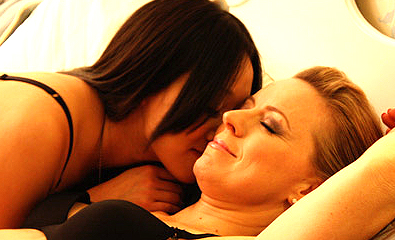
Dream Date
Two women meet in a hotel for a night of fun and to fulfill a wild desire.

Secrets and Toys
What happens when a mother and daughter discover each other’s secret through a comedy of errors?
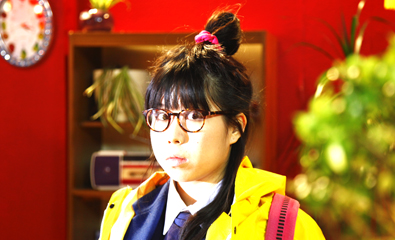
Happy Birthday Cindy Wei
Everything is about to change in the life of an awkward and insecure 15-year-old girl when she discovers the secret life of her older cousin, Michael.
Not Necessarily Lez/Bi, But Really Worth Checking Out
Lilting
Eat With Me
The Way He Looks
Pride
Already reviewed on AS by Kaitlyn
Now, it’s time for me to go nap because that was a lot of movies to tell ya’ about and it wasn’t even all we saw! Have you seen any of these films at other fests or screenings? I’d love to hear your thoughts on what you have seen or want to see ASAP! Many of these films will likely be released on Wolfe video and/or Netflix soon, so make a mental note now!
Sundance 2014 Was The Queerest Gayest Most Gay Sundance Ever
In the entertainment industry — where any movie that has been out for longer than three days is considered old news — Sundance, having retreated three eternal weeks into the past, is already ancient history. The denizens of Hollywood, having fulfilled their “pretending to care about independent cinema” quota for the year, have gone back to rewarding the straight white male protagonists of this year’s prestige pictures for their diversity (hey, some of the leads of this year’s Oscar frontrunners wore glasses instead of contact lenses!).
But I’m not quite ready to shift gears away from Sundance just yet, and here’s why: Sundance was SUPER FUCKING GAY THIS YEAR, YOU GUYS. Trust me, I was there. SO GAY. And in the stampede to move on to discussing the Academy Awards, a bevy of incredible queer cinematic offerings has been left in the conversational dust and I, for one, WILL NOT STAND FOR IT. As such, I present to you my Super Gay 2014 Sundance Film Festival Recap—and only 18 days late, which, like, we’re running on queer time, you guys, it’s totally fine. In fact, I’m practically early!
For those of you who aren’t up on your U.S. regional stereotypes, Utah is pretty much known as Mormon country — to the extent that establishments without a “club” license (different from a regular liquor license) are forbidden from mixing drinks in view of the customers, which basically means that instead of sitting at a bar across from a bartender, you’re pretty much just staring at a wall until a drink magically appears in your hand. More importantly, the only retail establishments allowed to sell alcohol are state-licensed liquor stores, so obviously my first move after arriving at my lodging was to immediately head back out into the cold in pursuit of such a location.
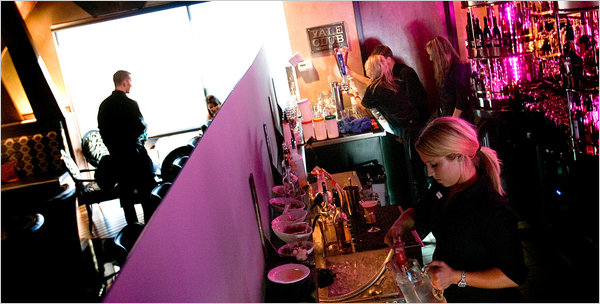
If you don’t see them, they’re basically just booze fairies.
And let me tell you, I have never seen so many alternate lifestyle haircuts in such a small place as I have taking public transit around Park City, except for maybe that one time I went to an open mic night at the anarcho-feminist bookstore café where I used to volunteer. They were everywhere — usually in pairs, as I repeatedly learned every time I started gazing longingly at some hyper-attractive queer individual only for their partner to sidle on up beside them. More on that later.
(Side note: Park City’s offerings on gay Tinder were pretty disappointing. I thought a tiny town flooded with independent film people would boast a decent enough array of queer visitors from L.A. and New York for Tinder browsing to be worth my time, but it was not so. I was greatly amused, however, by how many Salt Lake City queerfolk had ended their Tinder bios with the disclaimer “not LDS”—or, alternately, “LDS, but I’m cool, I swear!”)
At any rate, let’s discuss my big gay lineup from Sundance 2014.

Appropriate Behavior
I know y’all have heard of or watched The Slope, Desirée Akhavan’s webseries about “superficial, homophobic lesbians” (although Akhavan’s character is technically bisexual). Some of you probably also remember that she was working on a feature that would serve as a sequel to the series. Well, this is that movie! And it’s not a sequel anymore, just its own thing! Appropriate Behavior is a movie about Shirin (played by Akhavan herself), a bisexual Persian woman in her late twenties who is deeply closeted to her family. In the wake of a horrendous breakup with her girlfriend Maxine, Shirin belatedly attempts to get her life together: she moves into a new apartment in which her roommates may or may not be necromancers, gets a job teaching a “young filmmakers” class whose students are five years old, and stumbles through a series of sexual misadventures while trying to win back Maxine — all this interspersed with glimpses of their relationship and the reasons it went wrong. It’s a bit of a disjointed effort, comprised as it is of largely isolated scenes that don’t quite seem to add up to a coherent movie, but Akhavan is a tremendously hilarious and talented writer/director/actor, and representations of bisexuality in American culture thus far haven’t gotten much better than this.
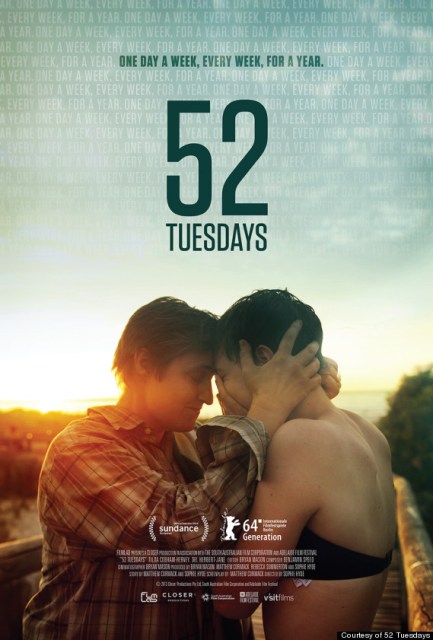
52 Tuesdays
You guys, this movie is precious. Shot every Tuesday for a year, 52 Tuesdays is an Australian film that chronicles how much (and how little) people can change over time. Ever since she can remember, 16-year-old Billie and her mother have been thick as thieves, so when she learns that her mother is planning on transitioning from female to male — and, more importantly, that Billie will be living at her father’s house for a year while her other parent, who has decided to take the name James, deals with the ramifications of this — Billie is blindsided. As a compromise, she and James decide to set aside every Tuesday afternoon as “them” time—and in the meantime Billie begins experimenting with her own sexuality. An exploration of both how painful and how liberating change can be, 52 Tuesdays — which, with its projected release date of late 2014, is the only film in this article presently slated for U.S. distribution — is an innovative and heartfelt piece of cinema.

The Foxy Merkins
A couple of years ago, a beautifully bizarre movie called Codependent Lesbian Space Alien Seeks Same made the festival rounds. This year the director, Madeleine Olnek, is back at Sundance with round two: a quasi-mockumentary buddy comedy about two lesbian hookers. Margaret is new to town and new to the business, so Jo, a beautiful (and purportedly straight) hooker with more experience under her belt, takes Margaret under her wing. To save the rent money they don’t have, they sleep under a tarp in the bathroom at Grand Central; to pick up the female customers who are apparently waiting all over New York City for a piece of female sex worker action, they solicit in front of an uptown Talbot’s. Blue is the Warmest Color this is not; The Foxy Merkins is something far more fun. This is an assertion with which every queer girl in Park City would appear to agree, by the way, because I swear to god they were all at my screening (with their partners, mind you, because us chronically-single folk can never have anything nice ever) and I’m pretty sure I scared a couple of them by staring too hard.
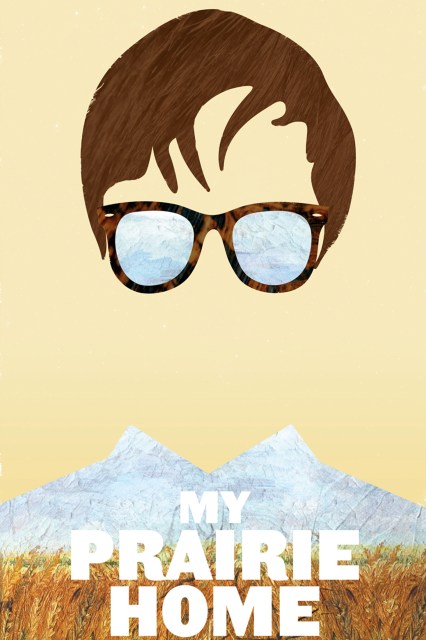
My Prairie Home
This screening was about an hour and a half after The Foxy Merkins at the same theatre, and pretty much all the aforementioned audience queers stuck around for My Prairie Home — with which I totally sympathize because THIS MOVIE IS SO GOOD Y’ALL. Malaika already gave you the lowdown on this beautiful film, but for those of you who need a refresher (or an incentive to keep it in your thoughts until it lands distribution outside of Canada), it’s a documentary musical about non-binary trans Canadian musician Rae Spoon which also happens to involve lots and lots of dinosaurs. Boom. Done. Movie of the year.
Those were the films I saw, but there were plenty of other queer (or queer-adjacent) offerings at the festival, including: The Case Against 8, a documentary following the fight to repeal California’s Proposition 8; Love Is Strange, a movie about two men who finally marry after 39 years together, only for one of them to lose his job as a result; Stranger By The Lake, a summer-love-gone-wrong thriller about a love triangle between three men in the lush, remote French countryside; and Drunktown’s Finest, a movie about a group of young adults living on a Navajo reservation, one of whom—Felixxia—is a young trans woman who dreams of getting off the reservation so she can become a model.
Over at New Frontier, the art-focused portion of the festival, there was the interactive documentary I Love Your Work, which chronicles the private lives of nine women who make lesbian porn. And, though it doesn’t technically fit the topic, I would be remiss without mentioning the German flick Wetlands, easily the weirdest film I’ve ever seen, which follows a teenage girl named Helen who, for the past several years of her life, has thought of herself as “a living pussy hygiene experiment” — until she winds up in the hospital for cutting herself while shaving her asshole. In one scene, Helen (who largely seems to identify as straight) recalls the time she hired a female hooker “just to try it” — whether the “it” she’s referring to is hiring a sex worker or having queer sex is unclear — and the whole thing is presented very matter-of-factly, probably because that’s the most normal thing Helen does throughout the entire movie.
Anyway, there you have it: the queerest mainstream film festival lineup in probably the history of ever! It was kind of hard to believe that I was at the same festival as Zach Kickstarter-Exploiter Braff, actually, because the Sundance I attended was teeming with creative individuals eager to tell stories that push the boundaries of life, love, and sexuality. Yeah, okay, maybe this is just a temporary trend — I’ve learned better than to hitch my wagon to any seeming glimpses of hope in mainstream culture, especially not in showbiz — but if so, well, I sure hope it sticks around a while.
